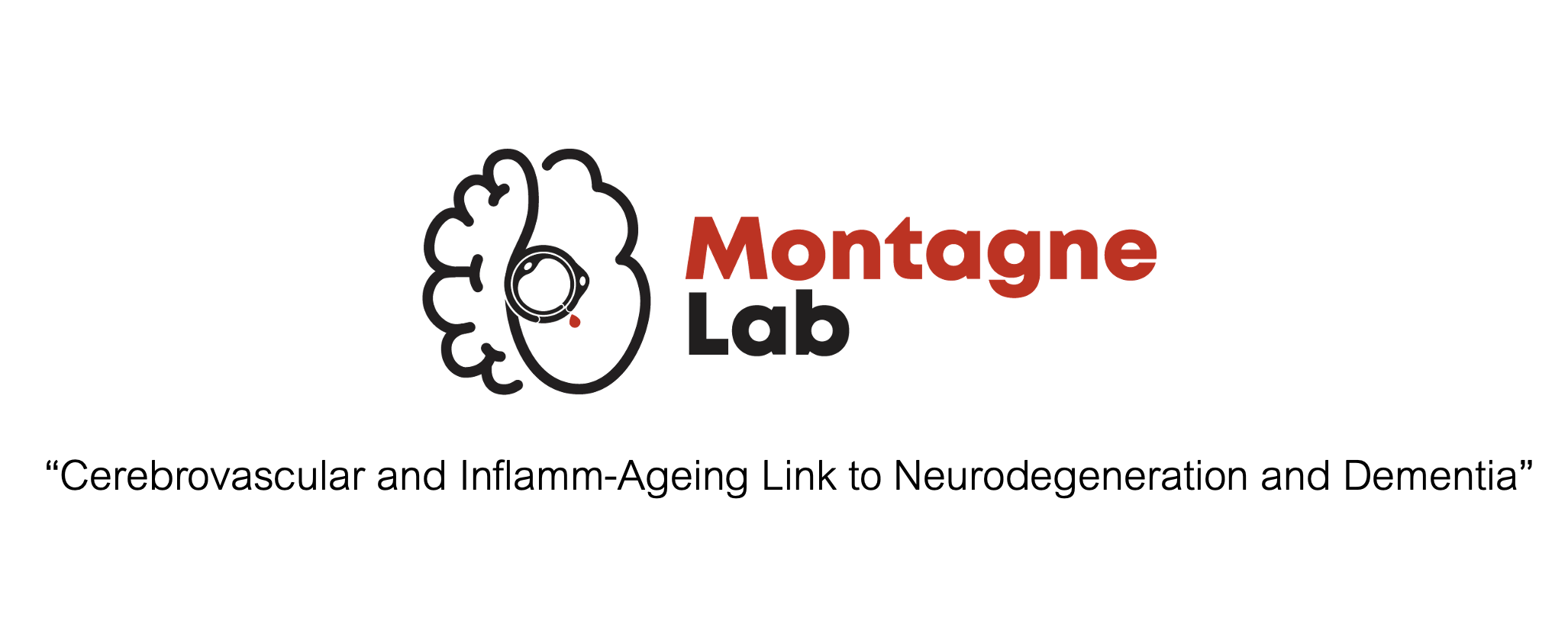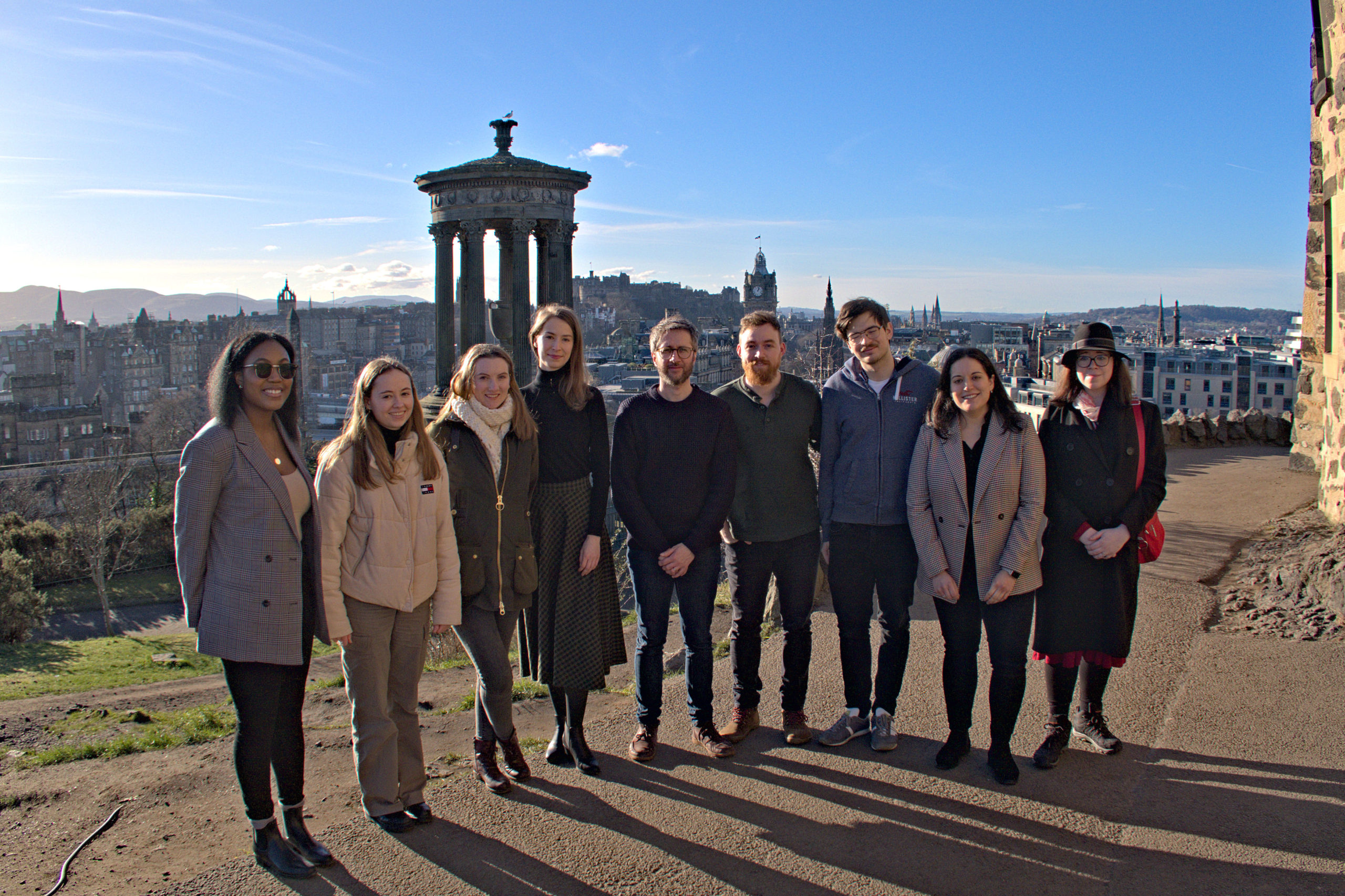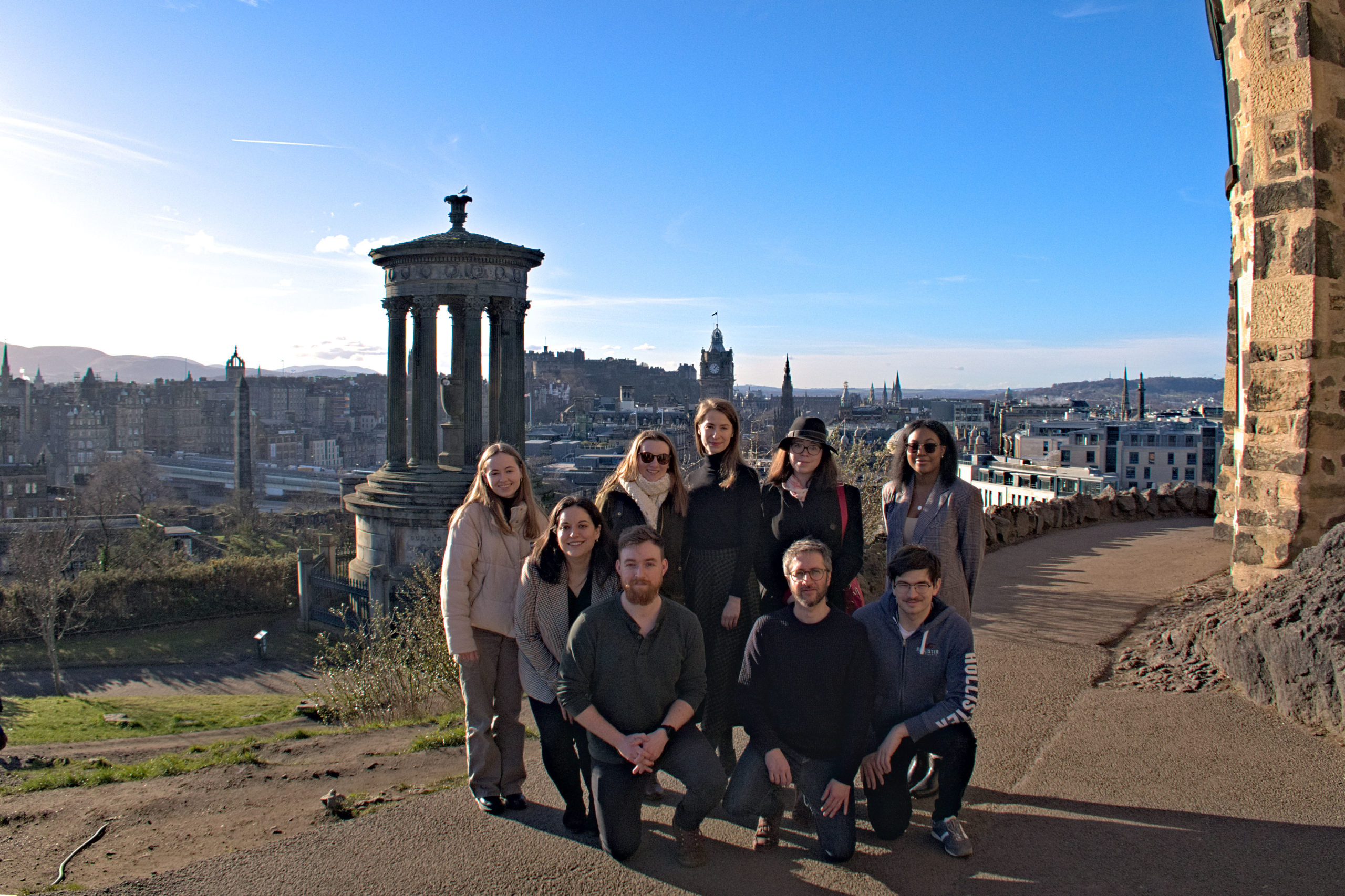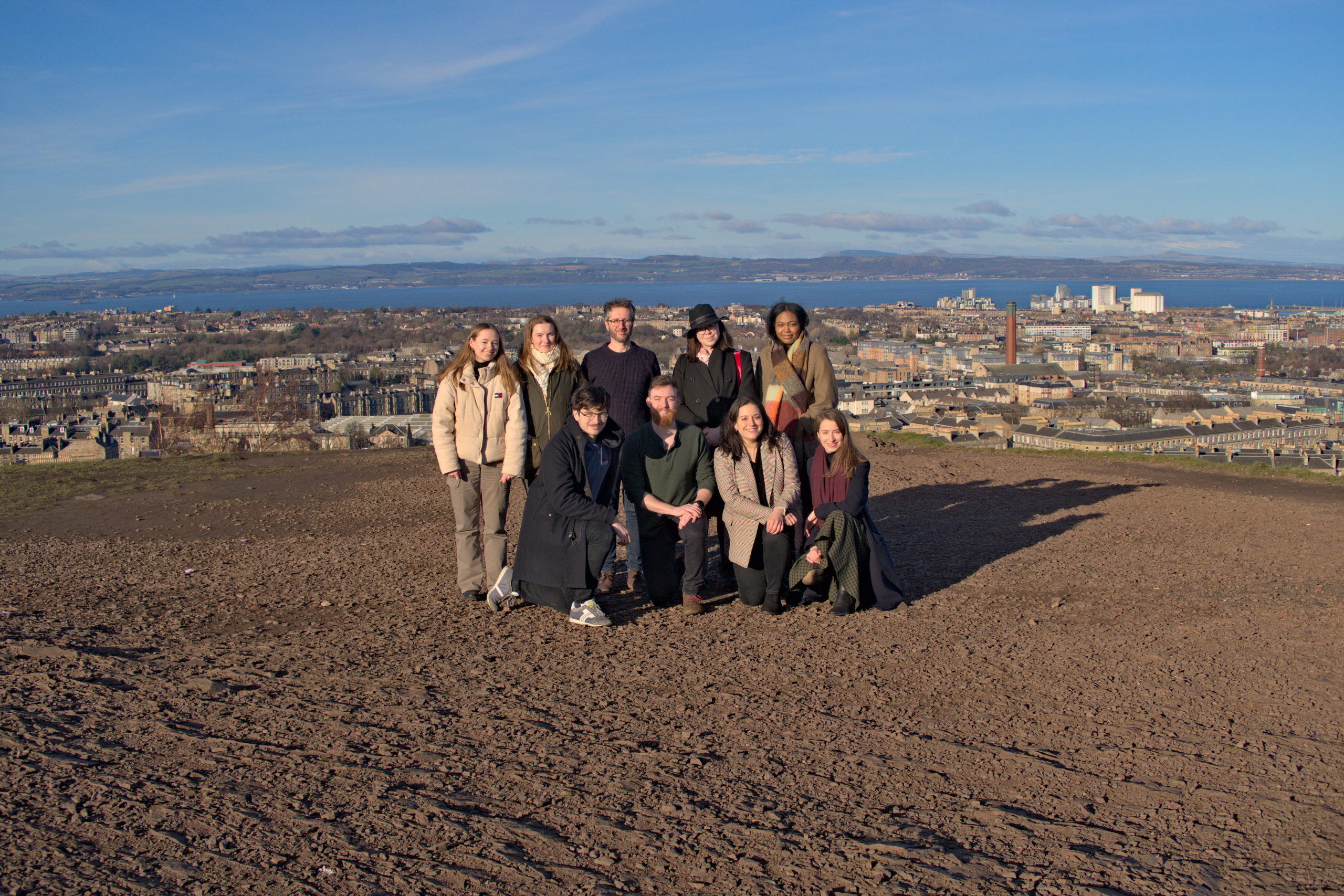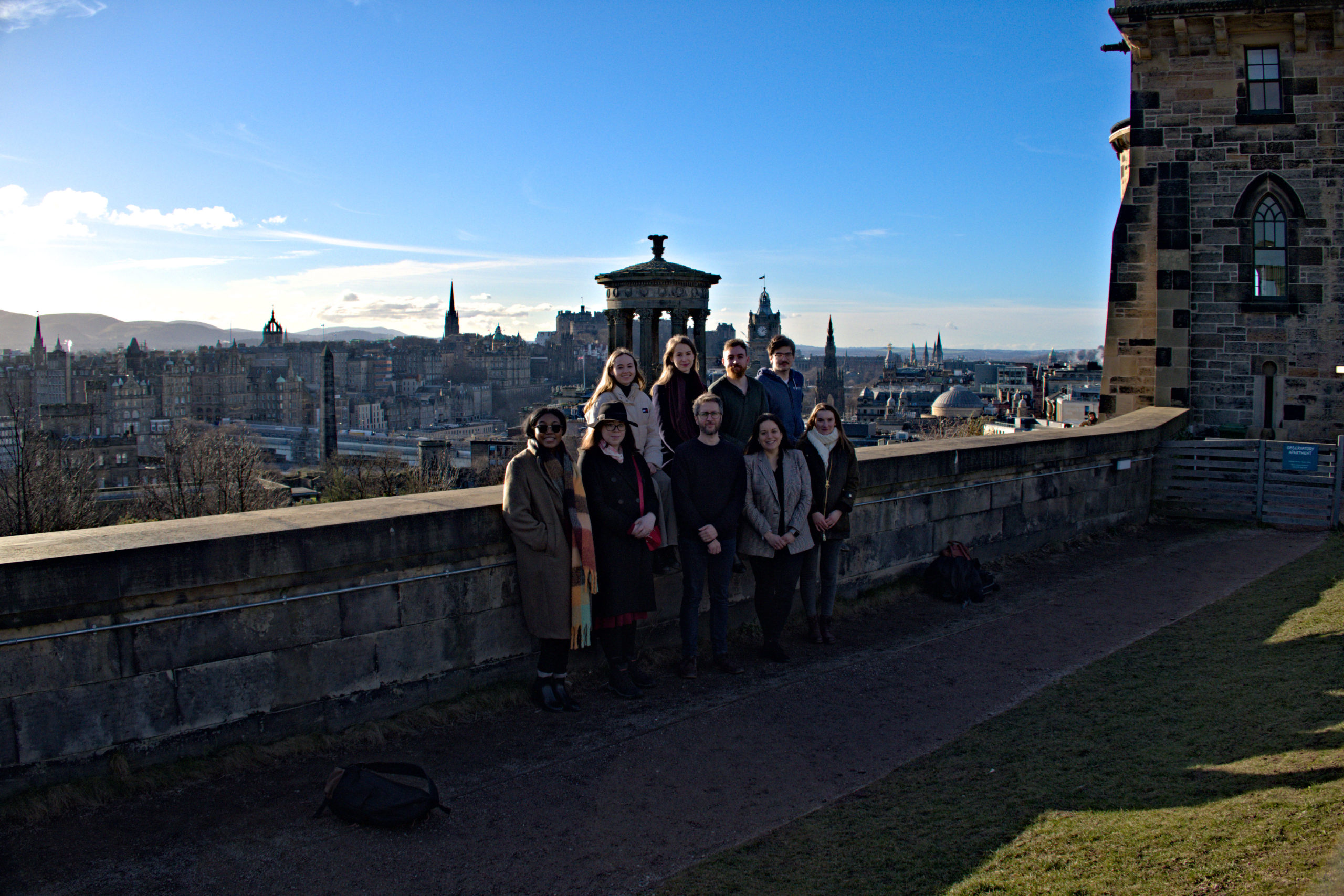28 January 2026
Dr. Krystal LAING!!
Wrapping up 2025 with some good news: on 12 November 2025, Krystal successfully defended her PhD viva. Her doctoral thesis, “Translational Insights into APOE4-Related Vascular Dysfunction: From Preclinical Models to Clinical Exploration”, investigated the role of APOE4 in cerebrovascular dysfunction.
Her PhD comprised a longitudinal study assessing vascular dysfunction and blood-brain barrier integrity at five-month intervals in mice aged 2 to 19 months. Over three years, this work integrated behavioural testing, MRI, histological analyses, proteomics, computational approaches, and clinical experimentation in tandem. Together, these efforts culminated in exciting findings demonstrating APOE4 genotype-dependent contributions to mitochondrial dysfunction and extracellular matrix remodelling within the cerebrovasculature.
The viva was examined by Pr. Tara Spires-Jones (University of Edinburgh) and Pr. Stuart Allan (University of Manchester), whose time and expertise are gratefully acknowledged.



Krystal would like to also extend a heartfelt thank you to her supervisors, Dr. Axel Montagne and Pr. Joanna Wardlaw, for their outstanding guidance and support throughout the project, as well as to the Translational Neuroscience PhD Programme and its directors. Special thanks go to the many collaborators and technical staff who contributed their time and expertise, and to the entire Montagne Lab, whose support and sense of community have been invaluable throughout this journey.
This research has been deeply meaningful, and Krystal hopes it will contribute to the dementia field while offering new perspectives for future research and provide a measure of hope for those affected by genetic risk.
By Krystal Laing (Postdoctoral fellow)
15 December 2025

The Montagne Lab would like to welcome OJU, Postdoctoral Researcher!
- Tell us about yourself, your background, and what made you choose Neuroscience (and/or vascular research) in particular?
In my final undergraduate semester, I undertook my first independent research project, and the experience lit an indelible spark for discovery in me. Later, I watched dementia slowly strip people of their memories, reshaping not only their lives but the relationships that sustained them. Since then, I became absorbed by one question: how could a single disease exert such a profound and intimate impact on a person’s world? That curiosity drew me toward the study of the brain. In grad school, I became fascinated by microglia, not only because they are the primary resident immune cells in the brain tissue, but also because they have been implicated in a variety of neurological disorders, including Alzheimer’s disease. During my doctoral training, I helped uncover that microglial P2Y12 prevents neuronal hyperexcitability and mediates intimate interactions between microglia and capillaries, hinting at an unexpected bridge between immune signalling and vascular functions. Naturally, this led me to think deeply about how the brain regulates and safeguards its energy systems.
- Why this University and this lab?
I chose the University of Edinburgh because it is a powerhouse of research and a true hub for brain-vascular biology. The Montagne lab’s vision to understand the vascular basis of cognitive decline and neurodegeneration offers an ecosystem where I can ask and pursue bold questions on immune-vascular interactions and its contributions to cognitive decline and Alzheimer’s disease.
- Tell us a bit about your research project?
At the heart of my project is a triad of cells: endothelial cells (gatekeepers of nutrients), pericytes (regulators of vascular stability and blood flow), and microglia (the immune system’s foothold in the CNS). These cells work concertedly to prevent neurons (the brain’s energy addicts) from becoming dysfunctional. In the Montagne lab, I will focus on microglia-pericyte physical interactions and how these shape endothelial functions and cerebral blood flow in health and Alzheimer’s disease.
- What would you like the impact of this project to be?
My aim is for this project to illuminate the underlying mechanism governing microglia-pericyte physical interactions, and how these interactions influence endothelial functions and cerebral blood flow. Ultimately, I hope the project would reveal drug-able targets to preserve cognitive functions in ageing and Alzheimer’s disease.
- What do you plan to do in the (near) future?
In the near future, I plan to: (i) establish foundational experiments for my project; (ii) deepen my technical skills in vascular imaging and cellular interactions; (iii) secure a fellowship; (iv) begin shaping a coherent research trajectory within the UK DRI environment that supports a pathway to becoming an independent scientist.
1 August 2025
ARUK Walk for a Cure 2025
Earlier this summer, on the 20th of July, the annual ARUK Walk For A Cure Edinburgh took place against the stunning backdrop of Arthur’s Seat. Members of the Montagne lab have been regular participants in this event, which raises awareness about Alzheimer’s disease and helps bring together people who’ve been affected by dementia, whether personally or through loved ones.
This year’s walk was particularly special, as Nela and Dorota helped organise activities designed to engage participants and share knowledge about the brain, Alzheimer’s disease, and the research we’re conducting here at the University of Edinburgh.



The day began with ominous skies and a forecast for heavy rain, but that didn’t stop us. We made our way to Holyrood Park and set up our public engagement stand. Throughout the day, many people stopped by to learn about the basic mechanisms of Alzheimer’s disease, craft their own brain hats, create model neurons, enjoy some brain-shaped candy, and, most importantly, talk with us about the work happening in our labs.


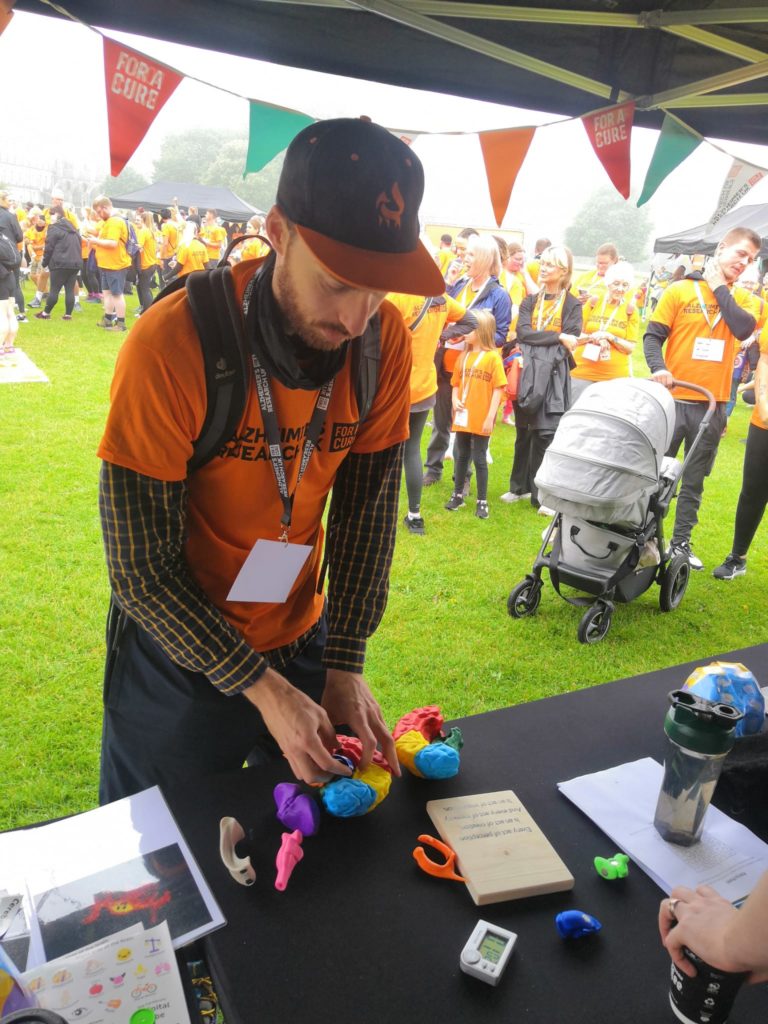
It was an enlightening and deeply moving experience to connect with so many individuals whose lives have been touched by this devastating condition. One participant shared, “Last year, I walked in support of my mum, who was living with Alzheimer’s disease. This year, after her passing, I walk to help find a cure, so that other families won’t have to go through what we did”.
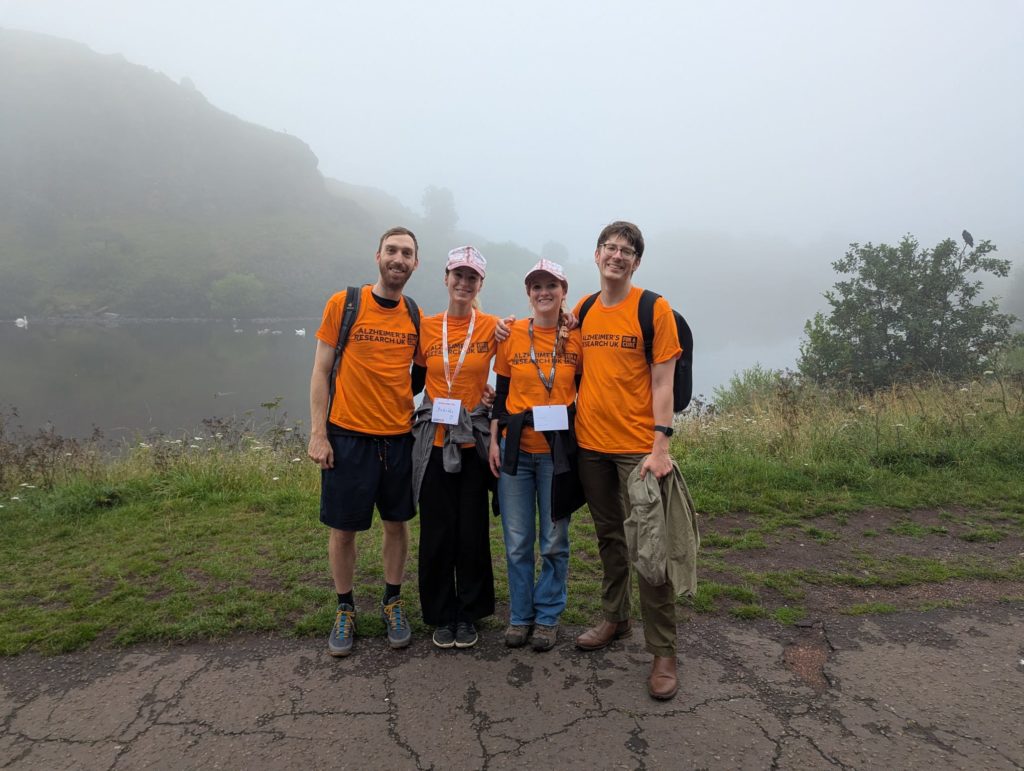
This sentiment reflects exactly what drives our work in the lab. Research is the only path to a cure, and events like this remind us why our work matters.
By Nela Fialova (Senior Research Assistant) & Dorota Stefancova (PhD student)
21 July 2025
UK & Ireland Early Career BBB Symposium 2025
Last week, we had the fantastic opportunity to spend a day in Ireland for the 14th UK & Ireland Early Career Blood-Brain Barrier (BBB) Symposium, hosted at Trinity College Dublin.
The day began at 2 am for our young scientific adventurers, who bravely traded their pillows for pipettes (or at least PowerPoint slides), catching an early flight from Edinburgh. Still half-asleep but full of curiosity, we landed in Dublin just in time to explore a bit of O’Connell Street, soaking in the views from the river bridge and bumping into an unusual early-morning trio: Dracula, Batman, and the Grim Reaper. Sadly, they weren’t registered for the symposium.



The event took place at Regent House, where we stocked up on caffeine and chocolate (scientific stamina essentials, at least six chocolates were consumed in the name of focus). Then, talks began. The symposium brought together a vibrant and welcoming community of early-career researchers working across the full spectrum of BBB research, from in vitro models to therapeutic strategies and clinical perspectives on BBB dysfunction, including in conditions like multiple sclerosis. The energy, curiosity, and quality of science made for a truly inspiring day.
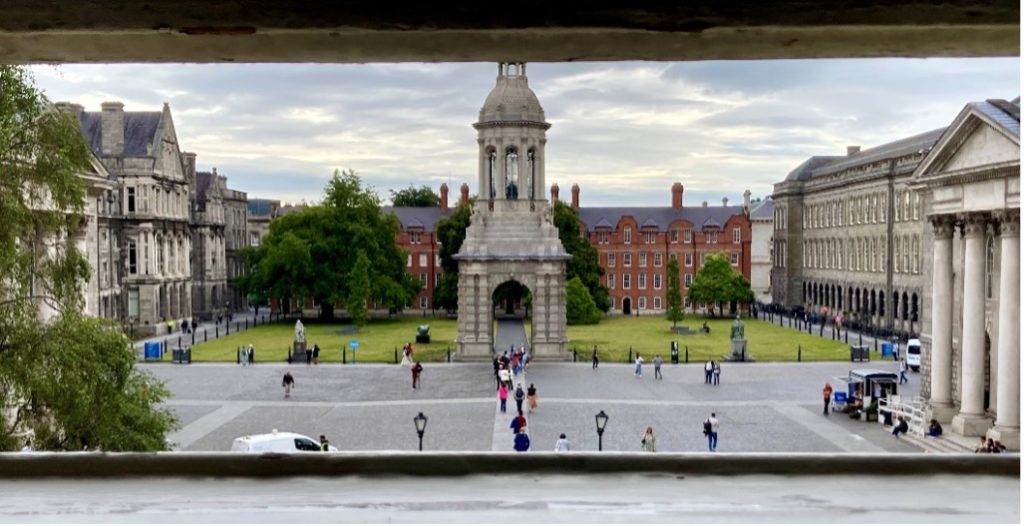
One of the day’s highlights from our lab was Audrey’s Blitz presentation. A postdoctoral researcher in the Montagne Lab, Audrey shared exciting findings on how disrupting pericyte mosaics in a selective depletion model challenges neurovascular coupling. She also presented updates on her ongoing work with MorphOMatic – a powerful tool you won’t want to miss and can discover there: https://git.ecdf.ed.ac.uk/achagnot/morph-o-matic.
Even more exciting: Audrey won the best blitz presentation Prize! A well-deserved recognition for both the quality of the research and her excellent presentation.


After a day packed with science and discussion, we enjoyed a relaxed walk around Trinity College’s stunning campus, followed by a final gathering at the Trinity Pavilion. Then, it was time to return to Edinburgh, once again under the stars, but this time with heads full of ideas and hearts full of Guinness.

A huge thank you to the organizers: Matthew Campbell, Natalie Hudson, and Avril Reddy for creating such a dynamic and supportive event. And of course, we’re extremely grateful to the Montagne Lab for giving us the chance to take part in this scientific journey!
By Clara Chuzeville & Anthea Choi, UG – Summer internship
11 July 2025
North Berwick Lab Trip: July Sunshine, Seabirds and Team Spirit
When the Scottish weather gives you sunshine, you seize the opportunity. That is exactly what we did. On the 9th of July, the Montagne Lab left the bustle of Edinburgh behind for a well-deserved day out by the sea in beautiful North Berwick.

We started our morning with coffee from Steampunk to kickstart our scientific minds, before boarding a boat to visit Bass Rock, home to the largest colony of gannets in the world. Along the way, we spotted puffins fluttering past and seals lounging in the sun, offering a grounding moment of calm and connection to nature.



Lunch at the local Lobster Shack was a treat. Fresh fish and chips enjoyed together in the sea breeze were followed by more beach time, where we run, played football and simply enjoyed each other’s company. It was a meaningful change to unwind and connect with each other, especially with the newest members of the lab who joined us for the Summer.
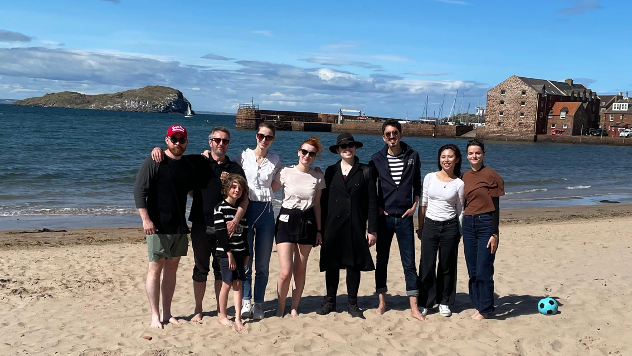
We wrapped up the day in true holiday style with delicious ice cream and a celebratory beer. It was a joyful reminder that science thrives not only in the lab but also through shared experiences, fresh air, and strong team bonds. In the Montagne Lab, science is not a solo journey, but it’s a collective one and days like this help build the trust and camaraderie that make great discoveries possible.
By Dorota Stefancova, PhD Student in the lab
25 June 2025
Inspiring young people and sharing knowledge about the brain and our work on dementia with the wider public is a vital part of being a scientist. That’s why our lab was thrilled to be invited to run a workshop at Stockbridge Primary School earlier this week.
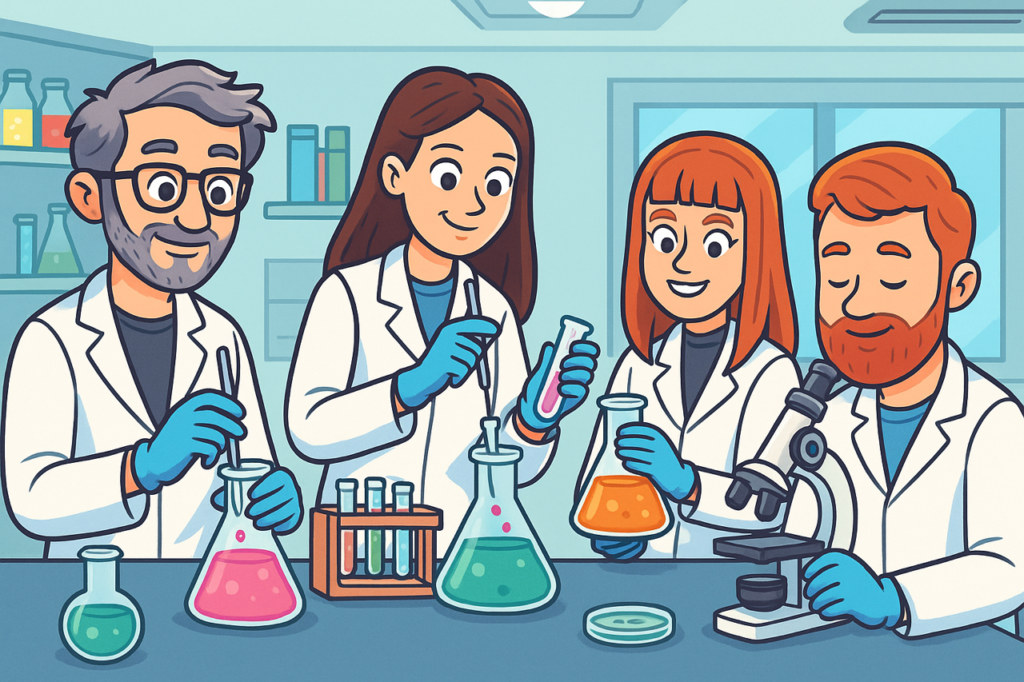
We were joined by Nela, Dorota, Conor, and Axel to deliver an interactive session for the P4 students (ages 8-9), offering a glimpse into what we do in the lab. Axel kicked things off with a short introduction to what brain scientists do and an age-appropriate explanation of dementia. The class was then split into smaller groups to rotate through hands-on activities led by Nela, Dorota, and Conor.




The students learned about different parts of the brain by colouring and assembling their own “brain hats,” crafted neurons out of colourful pipe cleaners, and even conducted a real-life experiment by making baking soda and vinegar volcanoes. The children’s energy and curiosity were infectious; they asked thoughtful (and occasionally hilarious) questions that reminded us why science communication matters. One of our favourites: “Why is that brain wearing Nike’s??”






This was a fantastic opportunity for us to step out of the lab and connect with the next generation of curious minds. Who knows, we may have even sparked the scientific journey of a future neuroscientist!
By Nela Fialova, Research Assistant in the lab
23 April 2025
Some moments during a PhD leave a lasting mark – not just because of what you learn, but for how they shift the way you see your research. Attending Brain Barriers 2025 at Cold Spring Harbor (USA) was one of those moments.



Earlier this month, Axel and I travelled to the historic Cold Spring Harbor Laboratory for the conference. After a long journey, we jumped straight into a packed schedule that ran from early morning breakfasts to late-night poster sessions. Despite the intensity of the program, the energy of the place, and the people, made it feel invigorating rather than overwhelming.
What made this meeting stand out wasn’t just the science, but the atmosphere. With fewer attendees than your typical conference, it felt more like a community than a crowd. Whether you were a first-year PhD student or a senior PI, everyone was part of the same open, ongoing conversation. Coffee breaks, meals, and poster sessions naturally turned into opportunities to exchange ideas, ask questions, and connect with researchers whose work I’ve long admired. The generosity and openness of the attendees made every interaction meaningful.





We heard from leading voices in the field: Ayal Ben-Zvi, Richard Daneman, Martin Lauritzen, Julie Siegenthaler, Caroline Ménard, Baptiste Lacoste, as well as from early-career researchers presenting exciting new findings. Talks spanned a wide range of topics, highlighting the role of brain vasculature in conditions like dementia, depression, and alcohol use disorder, and offered valuable insights into the future direction of the field.
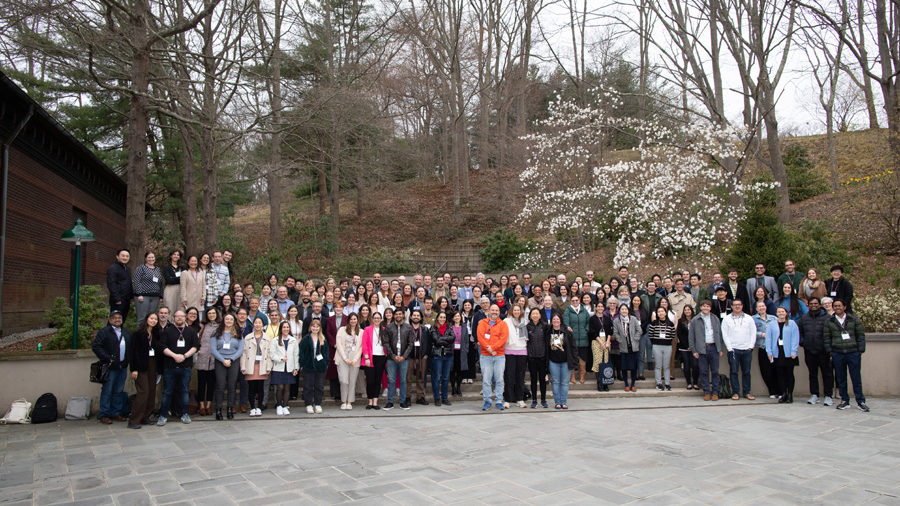
I’m incredibly grateful to the organisers and attendees for creating such a welcoming, inspiring environment. Special thanks to the Centre for Vascular Dementia Research, led by Prof. David Attwell, for making it possible for me to take part. Brain Barriers 2025 was a powerful reminder of what makes this field so exciting!
By Dorota Stefancova, PhD student in the lab
Lots to celebrate!
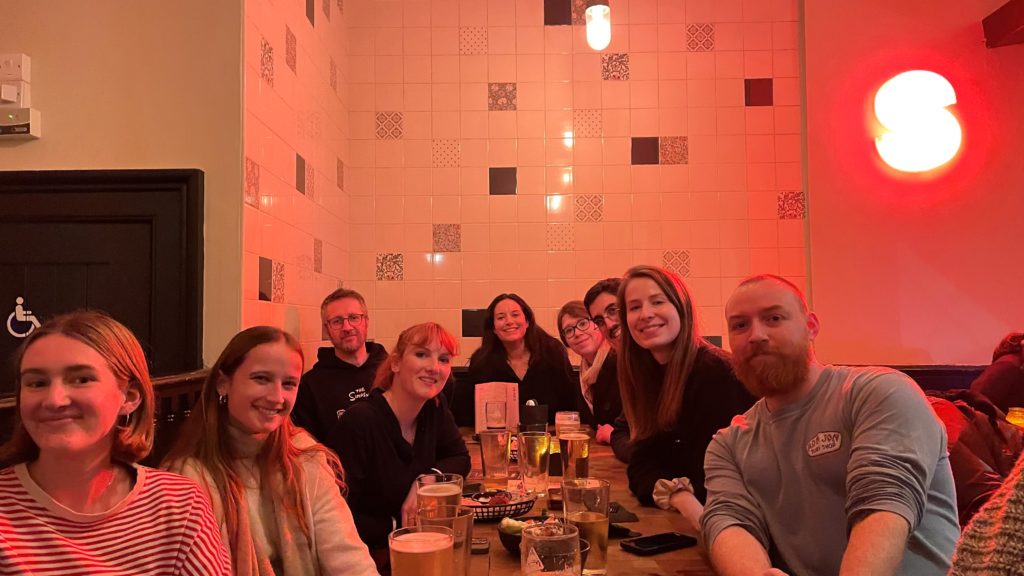
We had a good time last Tuesday on the 28th of January to celebrate: a recent paper accepted in Alzheimer’s & Dementia journal by Michael and Nela, 2 birthdays (Nela & Conor), 1 DRI pilot grant submitted (Conor), 3 pump priming grants submitted (Audrey, Conor, & Mathieu), Nela’s new contract, and 4 new students (Valentina, Natasha, Ellen, & Khaula).
From left to right: Ellen, Natasha, Axel, Dorota, Dany, Audrey, Mathieu, Nela, and Conor !
Krystal, Valentina, and Khaula were absent unfortunately.
25 August 2024
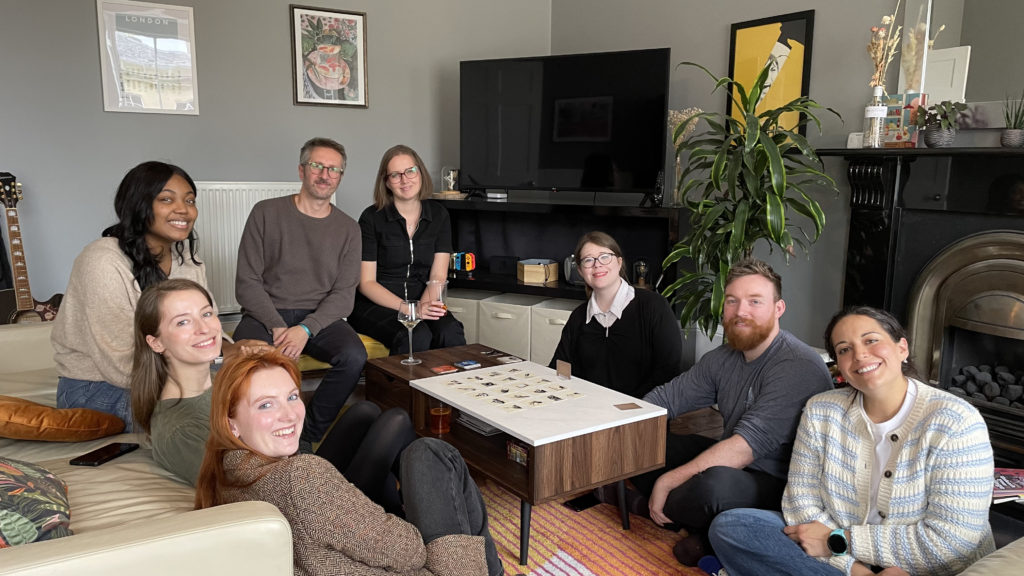
Due to the weather not being ideal for a beach day, we moved our Summer Lab get-together indoors.
Surrounded by amazing people 😍, delicious food 🍤, refreshing drinks 🍷 (#tatratea), and entertaining games 🀄️, it turned out to be the perfect way to wrap up the Summer here in Scotland!
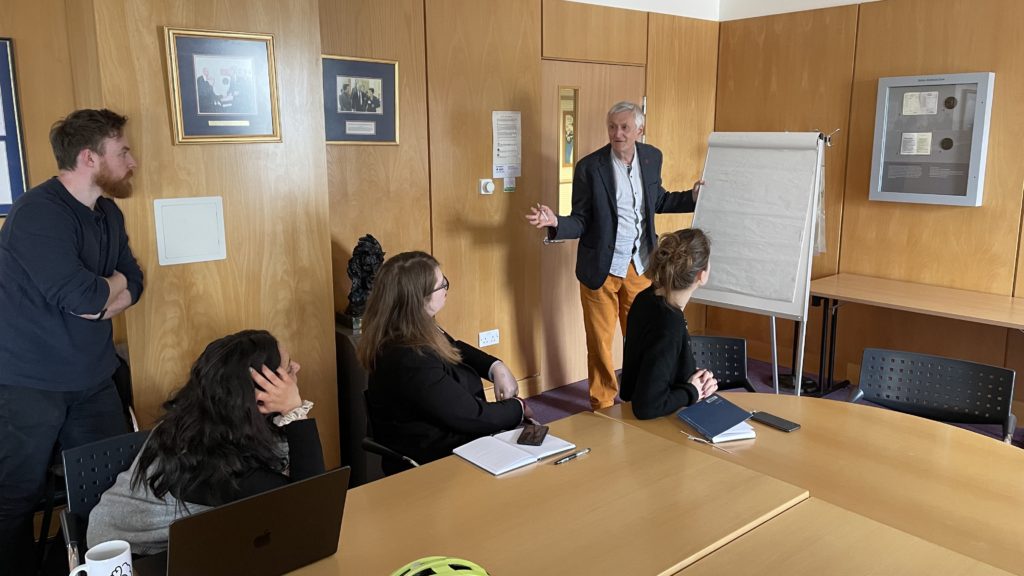
It was our great pleasure to host Prof. David Attwell from UCL at the UK DRI at the University of Edinburgh.
Prof. Attwell completed his first degree in physics at Magdalen College (Oxford), followed by a PhD in neuroscience focused on the electrophysiology of nerve and muscle cells with Julian Jack at Oxford University.
He then went to Berkeley (California) with Frank Werblin to study the retina, before joining the Department of Physiology at University College London, where he currently serves as the Jodrell Professor of Physiology.
Prof. Attwell’s diverse research portfolio includes cardiac electrophysiology, the ion channels in rod and cone photoreceptors and early visual processing, the properties of glial cells (astrocytes, oligodendrocytes, and microglia), glutamate transporters, brain energy use and how it constrains the evolutionary “design” of the brain, stroke, Alzheimer’s disease, and control of brain blood flow especially at the capillary level by pericytes.
The Attwell lab is currently interested in signalling between neurons, glial cells, and the vasculature. His lab is using patch-clamping, 2-photon imaging, immunolabelling, and mathematical modelling techniques.
Finally, Prof. Attwell received many awards and distinctions over the years. For instance, he received the Sharpey-Schafer Medal from the Physiological Society, the Medal of Australian Physiological & Pharmacological Society, the Kenneth Myer Medal, the FENS-Kavli award for mentoring neuroscientists, the Fondation Ipsen Prize for Neuroenergetics, and more. He is also a member of the Norwegian Academy of Science and Letters, the President-elec of the Physiological Society, and a highly cited scientist. And as you may have heard, Prof. Attwell has recently been appointed as the Centre Director for the groundbreaking new BHF-UK DRI Centre for Vascular Dementia Research where he will lead research aiming at understanding how blood vessel dysfunction leads to dementia.
He gave a fantastic lecture about the role of the microvasculature and node of Ranvier in early Alzheimer’s disease.





We are grateful for the opportunity to present our work at the CNIC Conference – Cardiovascular Risk Factors and Brain Health in Madrid (June 5th-7th) and promote the vascular contribution to dementia. It’s always great to meet up with ex- and current colleagues and friends, and make new ones. Among many fantastic researchers, it was great to interact with Mickael Tanter, Sandro Da Mesquita, Costantino Iadecola, Marta Cortés-Canteli, Josef Anrather, Katerina Akassoglou, Rebecca Gottesman, Martin Dichgans, María Ángeles Moro, and others.
Link: https://cnic-conference.com

Krystal has recently been awarded a UK DRI Proteomics Platform Award for her proposal titled “Proteomic profiling of Apolipoprotein E-related vascular destabilisation in aging mouse model“. Well done!!!
Krystal is currently in the middle of her second year, focusing on the impact of the E4 variant of Apolipoprotein, a well-known genetic risk factor for late-onset Alzheimer’s disease (AD), on cerebrovascular dysfunction and cognitive decline. Her research uses animal models and local human cohorts to explore these effects. She is conducting in vivo MRI scans, carrying out behavioural assessments, and analysing post-mortem brain tissues from ageing humanised APOE3 and APOE4 knockin mice. Her early findings suggest subtle but significant vascular dysfunction, including abnormalities in cholesterol regulation and angiogenesis.
Krystal’s proposal to utilise mass spectrometry to map the proteomic landscape of the brain vascular cells in her humanised APOE mice is suited to provide novel insights into the vascular contribution to AD. The relationship between vascular health and APOE genetics in dementia is still fairly new, and her work could reveal crucial information about endothelial and pericyte roles in brain health, potentially leading to better diagnostics and treatments.


On the 25th of May, both Krystal and Michael took part in the Edinburgh Marathon Festival 5K in support of Alzheimer’s research. Well done!!!
There’s still time to donate to Alzheimer’s Research! If you’d like to support or spread the word, please feel free to follow the link: https://shorturl.at/m2IHo
VasOMatic, an ImageJ tool to investigate pericytes and endothelial cells using microscopy
Pericytes are gradually lost with age, leading to the impairment of cerebral blood flow, neurovascular coupling, and leakage of the blood-brain barrier. This trait is exacerbated in dementias. But when it comes to assessing it from microscopy slices, the process is often tedious and time consuming.
That is why we developed a macro dubbed VasOMatic, to accelerate data collection. In addition to providing an estimate of the pericyte coverage in delineated regions-of-interest, VasOMatic also extracts vascular diameter and length, allowing for correlation of pericyte coverage over vessel diameter. VasOMatic comes with a R script dedicated to the visualisation of the large datasets extracted.
Both scripts, developed by Audrey Chagnot, are available with guidance and example images on GitLab: https://git.ecdf.ed.ac.uk/achagnot/vas-o-matic.
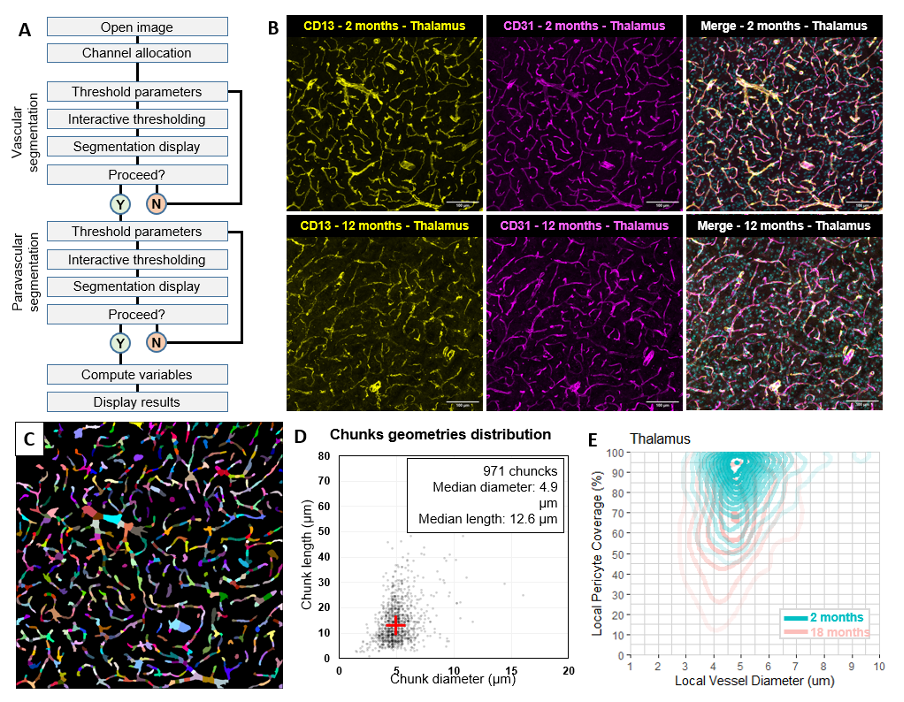
Figure. VasOMatic run on example images. (A) General code structure, (B) Example images, (C) Depiction of the chunks created by VasOMatic, (D) Distribution of the chunks geometry, (E) Kernel density map created by the ChunkAnalyzer script from the chunk data generated by VasOMatic.
Citation:
CHAGNOT, A., MONTAGNE, A. “Vasomatic 0.0.1”. Zenodo, May 15, 2024. https://doi.org/10.5281/zenodo.11198372
We are grateful for the opportunity to present our work at international and national meetings and promote the vascular contribution to dementia. It’s always great to meet up with ex- and current colleagues and friends, and make new ones. We presented our lab work at VasCog in Gothenburg (Sept 14-16), EMBO Stroke-Immunology Workshop in Munich (Sept 18-21), UK DRI Connectome in Brighton (Oct 3-4), and ECNP in Barcelona (Oct 7-10).
Among many fantastic researchers, we were able to discuss and interact with Tony Wyss-Coray, Virginia Lee, Raj Kalaria, Roxana Carare, Charles DeCarli, Fanny Elahi, Henrik Zetterberg, Costantino Iadecola, Lydia Sorokin, Katerina Akassoglou, Andy Shih, Josef Anrather, Denis Vivien, Stuart Allan, Marion Buckwalter, Mickael Tanter, Jonathan Kipnis, Maria Angeles Moro, Matthew Campbell, Caroline Menard, and others.
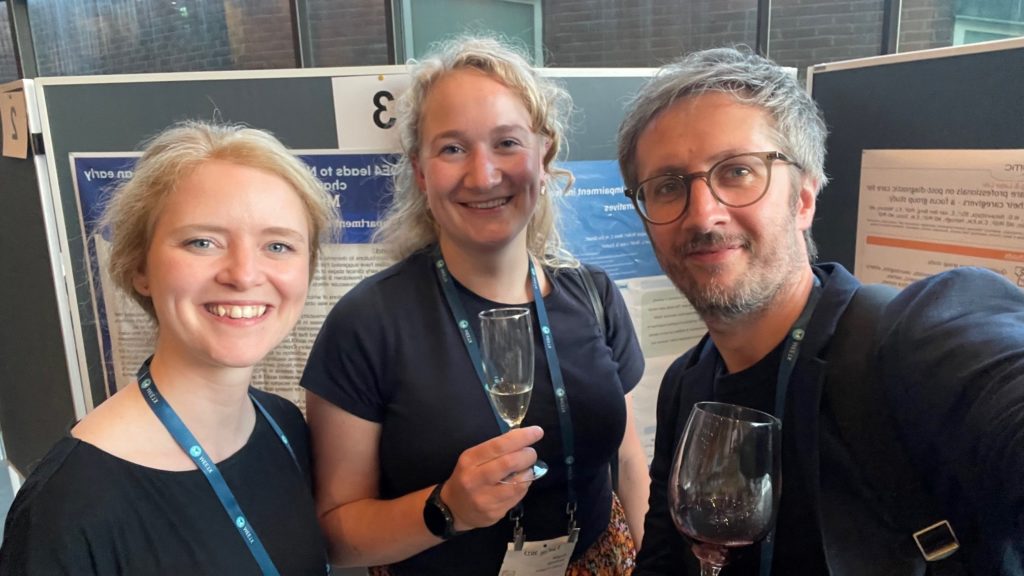
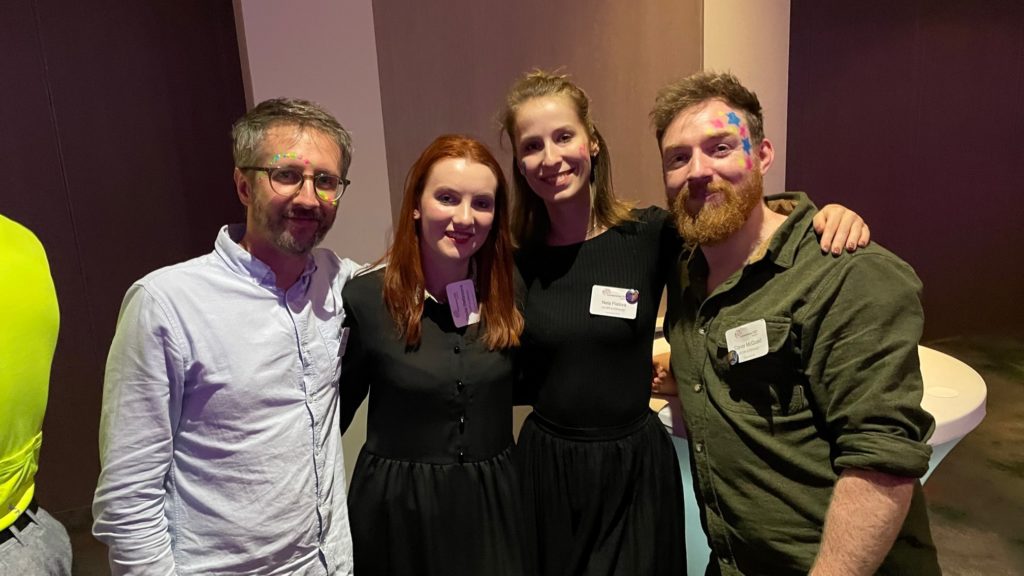
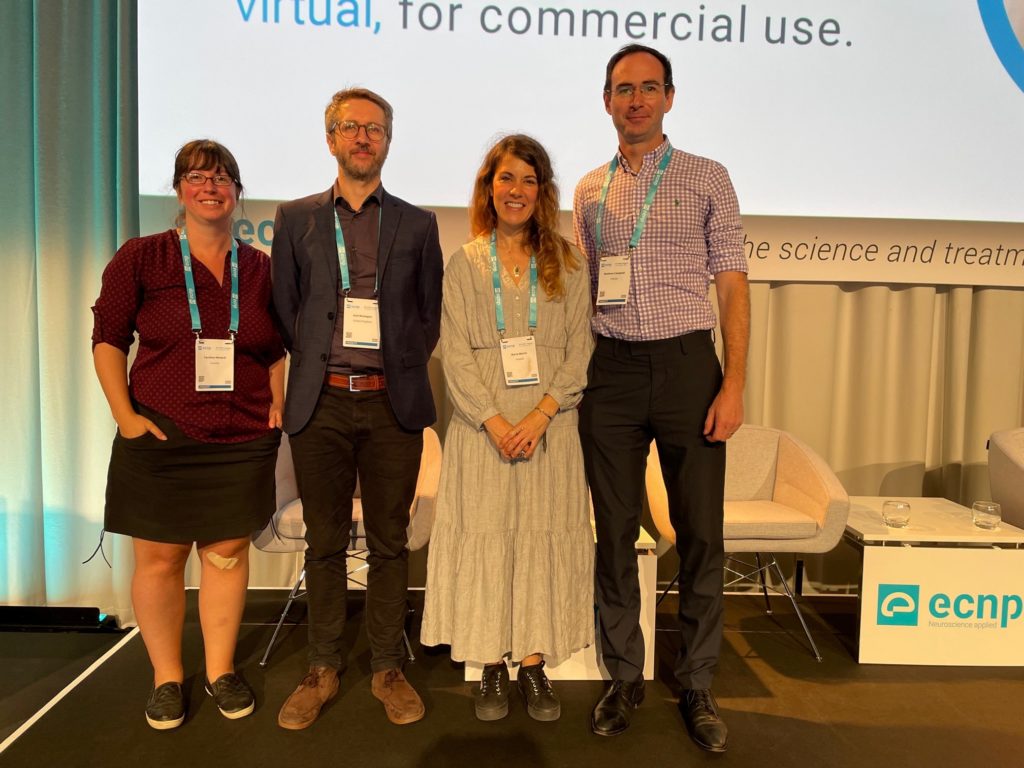
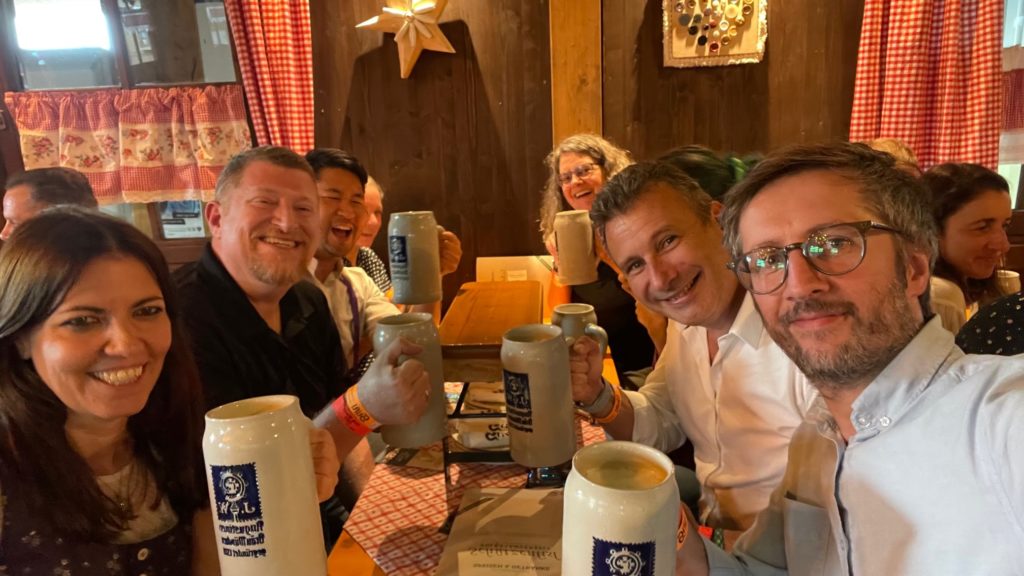
For more information on these conferences:
VasCog 2023: https://conference2023.vascog.org/speakers/#instructions
EMBO Stroke-Immunology Workshop 2023: https://meetings.embo.org/event/23-stroke-immunology
ECNP 2023: https://www.ecnp.eu/Congress2023/ECNPcongress
This week, fellow PhD student Krystal Laing and I had the privilege of attending the Transatlantic Leducq Network Meeting in Leeds Castle in the south of England. I have had the honour of being a part of this network for the past five years and it has been an unforgettable and very fruitful collaborative experience. The Fondation Leducq have funded an international network linking clinical and preclinical researchers across North America and Europe with the aim of investigating the role of the perivascular space in small vessel disease. Throughout the years, we have collaborated in a series of substantial preclinical and clinical research projects, culminating in the completion of several large, longitudinal neuroimaging studies, intervention/treatment studies and lab-based investigations that have resulted in many impactful collaborative publications that shape the way we understand Small Vessel Disease pathogenesis. The meeting was attended by several research fellows from all international sites involved, as well as network leaders including Joanna Wardlaw, Berislav Zlokovic, Sandra Black, Helene Beneviste, Serge Charpak and Kenneth Smith.
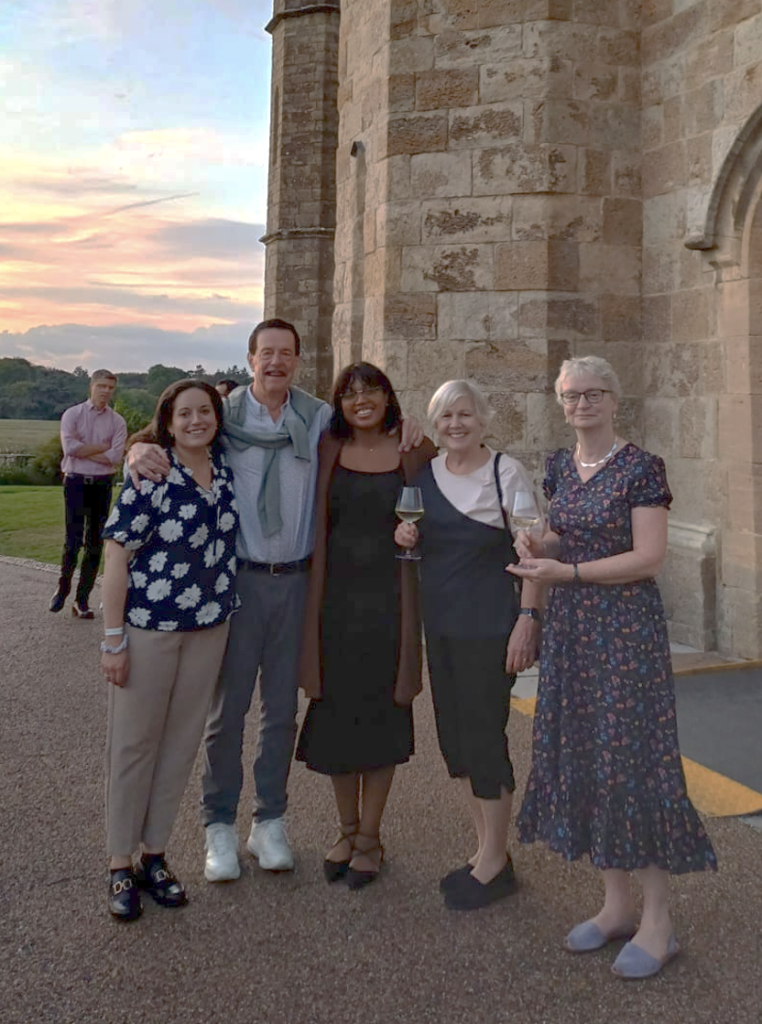
Not only did we get to stay in a breath-taking castle deeply steeped in rich history, but we both also had the opportunity to present some of our research and receive positive and constructive feedback from field-leading scientists around the world (I even got to keep a mug after winning a prize for best DataBlitzpresentation!). This meeting was not without some hints of sadness and nostalgia, as the network has now come to an end, but it has left us inspired to keep tackling these important questions and doing so with deliberate and purposeful international collaboration.
For more information on the Leducq Network, please visit: https://www.small-vessel-disease.org/
Dany Jaime Garcia
14 August 2023
BonnBrain3 Meeting 2023!

Axel was an invited speaker at the 6th International BonnBrain³ Conference in Bonn last week. This was a fantastic meeting with diverse topics ranging from cellular diversity to complex behaviour in health & disease. Our ‘Neurovascular Unit’ symposium on Wednesday morning was excellent with the great neuroscientists Pablo Blinder (Tel Aviv University), Annika Keller (University of Zürich), and Caroline Ménard (Université Laval).



Thank you to the organisers (Carmen Ruiz de Almodovar & Gabor Petzold) for this very inspiring meeting!
The 2023 edition of Alzheimer’s Association International Conference (AAIC) was held in Amsterdam, Netherlands. From the airport to the conference centre, the city welcomed all who would attend the meeting with purple banners and signage.
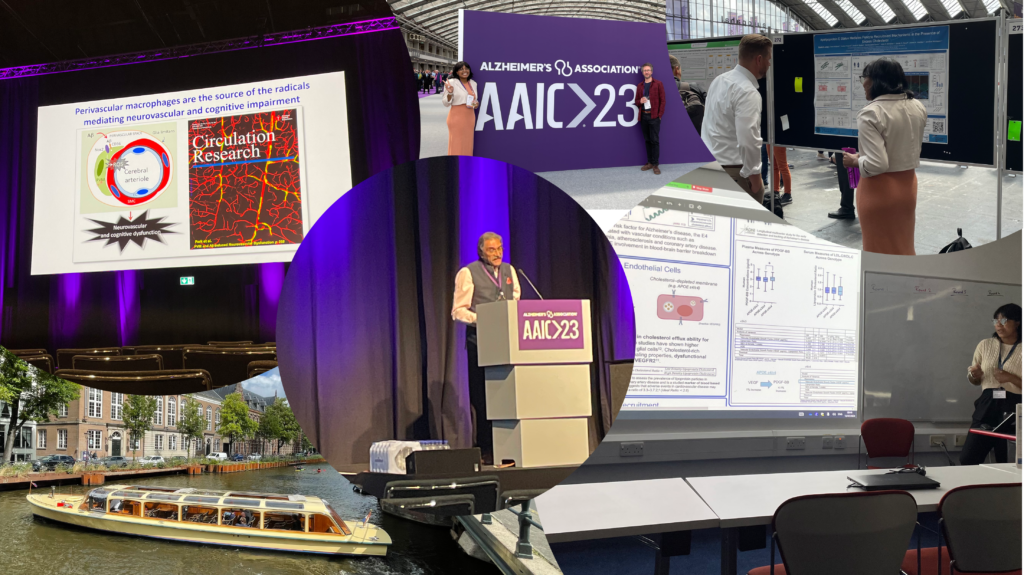
The 5-day conference was teeming with poster presentations, plenary talks and lectures. Some to note include the important discussions around the importance of Inclusion in Research and Clinical Trials, as well as advancements in Lecanemab and Donanemab drug trials. The Emerging Concept Series – Understanding the Role of the Vascular System in Dementia was of particular import with engaging lectures from Berislav Zlokovic, Constantino Iadecola, Rajesh Kalaria and Sudha Seshadri.
Krystal presented a poster on interactions between APOE genotype, plasma measures of pericyte recruitment and serum-derived cholesterol in preclinical and clinical models.
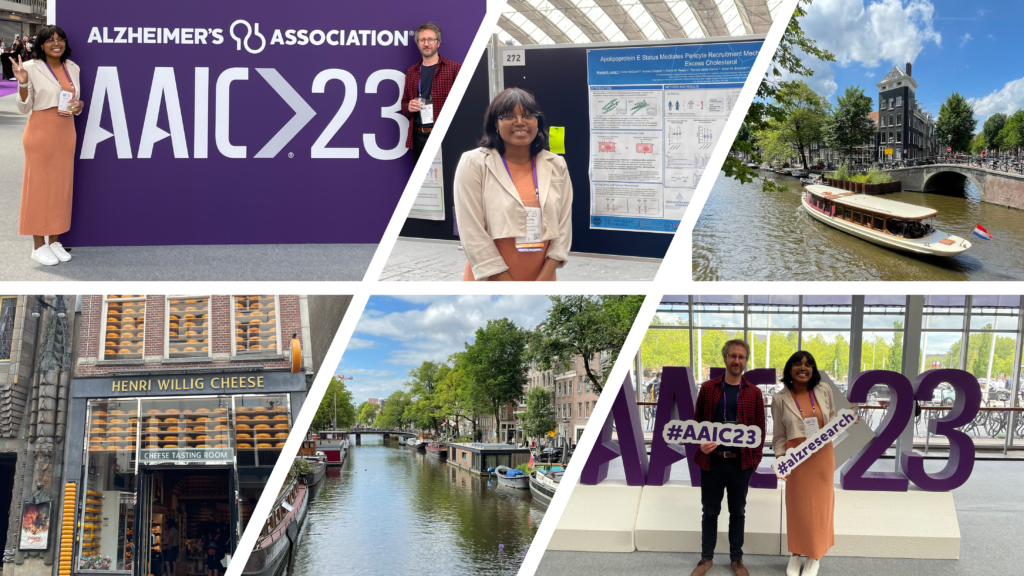
Axel and Krystal had the pleasure of networking and connecting with scientist at the UK DRI networking meeting (along with DPUK, ASUK and ARUK), as well as international scientists within the field.
24 July 2023
Lab Summer BBQ 2023!
We had a good time for our Lab BBQ on Sunday the 23rd of July!
Amazing people 😍, great food 🍔, nice drinks 🍻, tasty desserts 🍰, fun games 🎯, a great recipe for a perfect Sunday!
Audrey, Dany, Dorota & Emil, Krystal, Nela & Svilen, Elodie, Charlie, and myself! We missed Conor & Haz and Daniel, which is a good excuse for a second round soon!
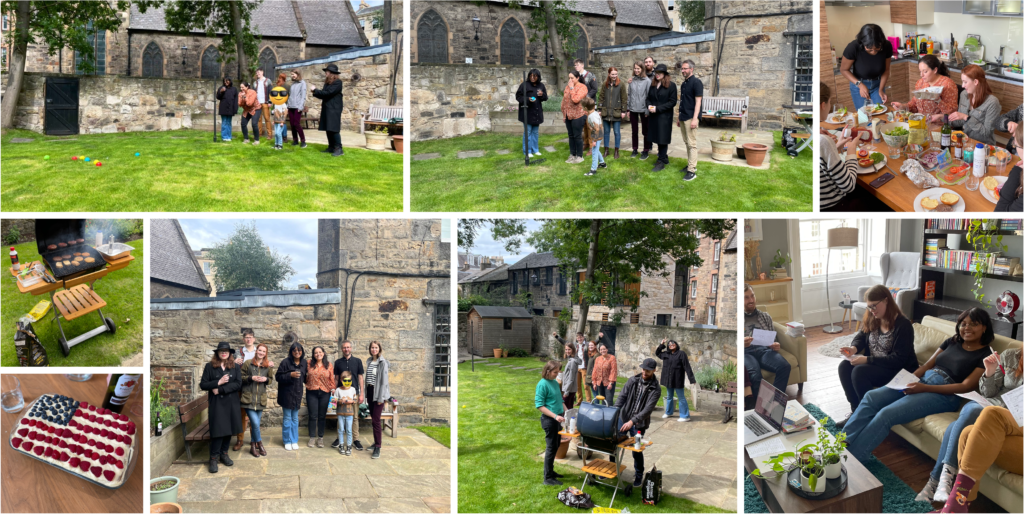
7 July 2023
CVB 2023 in Uppsala!



2023 edition of Cerebral Vascular Biology (CVB) meeting was held at Uppsala Konsert & Kongress last month. Audrey, Conor, and I had a blast surrounded by the very best cerebrovascular biologists. A perfect way to stay on top of the vascular field which is moving quite fast nowadays.
Audrey presented a poster on the advascular structures of the mouse brain and Conor a poster on immune-vascular interactions in a context of ageing and dementia.




It was great to catch up with colleagues, friends, and make new friends as well. It was particularly nice to chat and catch up with Richard Daneman, Caroline Menard, Sebastian Lewandowski, Annika Keller, Krzysztof Kucharz, Martin Lauritzen, Ayal Ben-Zvi, Nicolas Tournier, Ralf Adams, Katerina Akassoglou, Jony Kipnis, Benoit Vanhollebeke, Chenghua Gu, Martin Dichgans, Christer Betsholtz, Stefan Liebner, Candice Chapouly, Thierry Couffinhal, and a few more.



We also had the chance to spend some time at the beautiful Uppsala Castle for the Conference Dinner. Finally, we went to the countryside to spend the last night at Annika Keller’s house for a lovely BBQ with friends!



3 June 2023
ISMRM 2023 in Toronto!
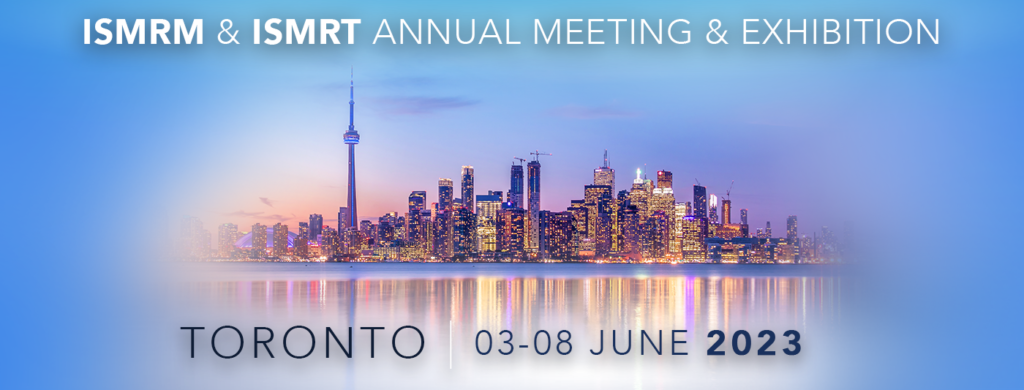
We were invited to contribute to the ISMRM Weekend Course on ‘Key Contrast Mechanisms for Imaging Neuroinflammation’. Due to unforeseen circumstances we could not attend in person but Audrey Chagnot recorded an amazing video called “Imaging Blood-Brain Barrier Permeability with Gd” which will be aired on the 4th of June at 13:40 Toronto time.
You can enjoy the recording here as well:
16 April 2023
We were very happy to be part of the Cajal School in Bordeaux in late March!
Axel Montagne and Audrey Chagnot taught MRI theory and practice to 4 amazing students: Joanna, Réka, Luisa, and Eline. These very intense 8 days were dedicated to scanning mice receiving a Gadolinium bolus to study BBB leakage.

In addition to the collection of brilliant instructors and students, we enjoyed the talks of leading scientists in the field of neurovascular coupling, such as David Attwell, Martin Lauritzen, Andy Shih, and many more!

Having a moment of spare time, we even scanned a few vegetables and fruits, would you be able to recognise what is what?

14 April 2023
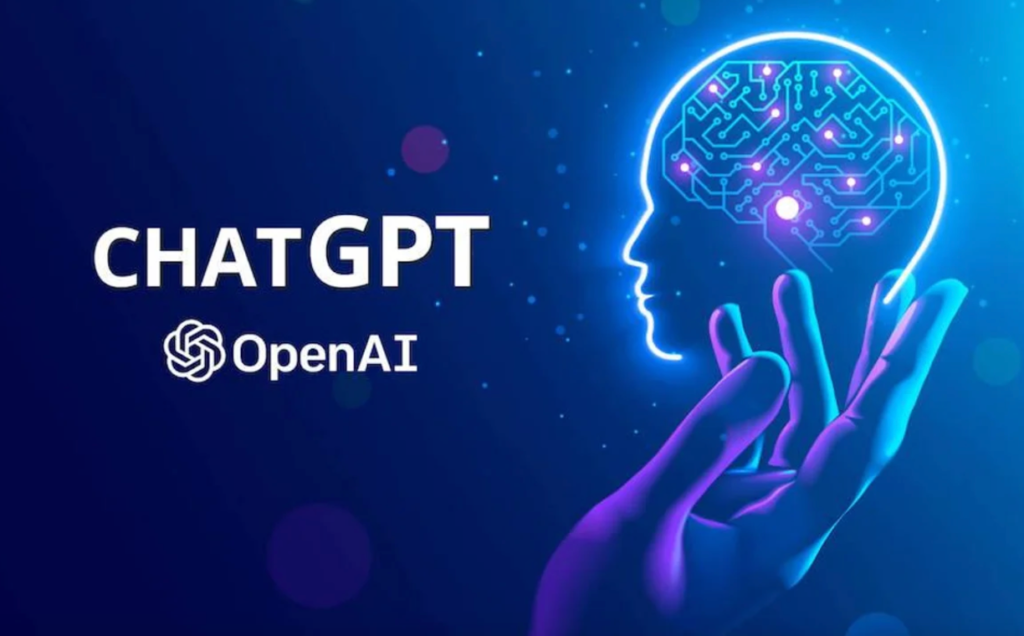
The Mighty Pericytes by ChatGPT
In the brain, where neurons fire,
And thoughts and feelings all conspire,
There’s a cell that plays a vital part,
And it’s called the pericyte.
It lines the blood vessels in the brain,
And helps regulate blood flow with no strain,
For it senses the need for oxygen,
And can contract to adjust the flow within.
It’s not just a passive cell at all,
For it communicates with neurons that call,
And helps to maintain the blood-brain barrier,
Protecting the brain from toxins that may enter.
Pericytes, small but mighty,
Working hard to keep the brain tidy,
They play a crucial role in our cognition,
And help to keep the brain in motion.
So let us not forget this tiny cell,
For without it, our brain may not function so well,
Pericytes, we owe you gratitude,
For keeping our brain in the best attitude.
Dialogue between a pericyte and an endothelial cell… by ChatGPT
Pericyte (P): Oh hey there, Endothelial Cell. I couldn’t help but notice you seem a bit preoccupied. What’s on your mind?
Endothelial Cell (EC): Hey, Pericyte. I’ve just been thinking a lot about our roles in brain aging lately. I mean, we’re both so essential to the brain’s function, but how do our roles change as the brain ages?
P: Ah, I see what you mean. Well, I know that one of my key functions is to help regulate blood flow in the brain. But as we age, the blood-brain barrier can become compromised, which can lead to cognitive decline and even neurodegenerative diseases.
EC: Yes, I’ve been reading about that too. And as an endothelial cell, my job is to form and maintain the blood-brain barrier. But as we age, that barrier can become leaky, which can allow harmful substances into the brain.
P: Right, and I also know that we pericytes are involved in clearing out toxic proteins from the brain, which can accumulate as we age and contribute to neurodegeneration.
EC: That’s interesting. And as an endothelial cell, I also play a role in removing waste from the brain through the glymphatic system. But again, as we age, that system can become less efficient, which can lead to the accumulation of harmful substances.
P: It seems like we both have important roles to play in maintaining brain health, but as the brain ages, those roles become more challenging.
EC: Yes, and it’s a bit concerning to think about. But at least we can take comfort in the fact that researchers are actively studying brain aging and trying to find ways to promote healthy aging.
P: That’s true. And who knows, maybe someday they’ll discover new ways for us to help keep the brain young and healthy.
EC: Let’s hope so. In the meantime, we’ll just have to keep doing our best to keep the brain functioning as well as possible. Thanks for chatting with me, Pericyte.
P: Anytime, Endothelial Cell. It’s always good to have a brain cell to chat with.
1 March 2023
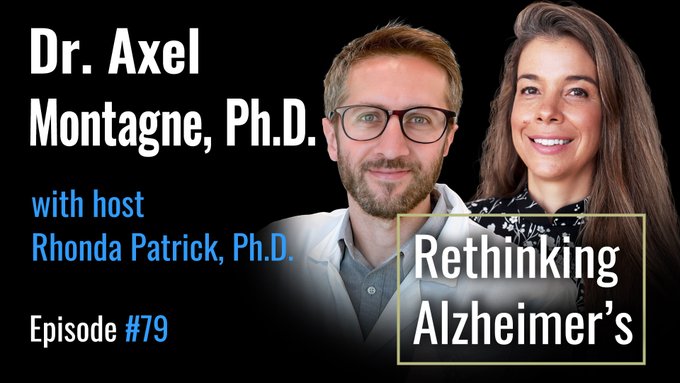
‘Solving Alzheimer’s and Dementia with Blood-Brain Barrier Repair’ – Discussion with host Dr. Rhonda Patrick!
Last January, I had the chance to discuss about different topics revolving around vascular health and dementia for nearly 2 hours with Dr. Rhonda Patrick, host of FoundMyFitness podcast. Below is a list of topics that we talked about. Hope you will enjoy it!
- What dementias have in common?
- The importance of preserving small blood vessels (in the brain)
- Changes in the blood-brain barrier in ageing that cause “leaking”
- Predicting cognitive decline early with biomarkers – an opportunity for intervention?
- Why targeting amyloid isn’t enough?
- The impact of the APOE4 genotype on brain vasculature
- The cause of white matter damage in the brain
- Why the loss of omega-3 transport affects pericytes?
- The role of exercise in prevention of blood-brain barrier dysfunction
- Why high heart rates during exercise preserve brain function?
- The role of exercise in preserving vision health
- Why leaky vessels damage myelin and the brain?
- Can you have more than one type of dementia?
- Does the breakdown of the blood-brain barrier cause “type 3 diabetes”?
- Why omega-3 may prevent detachment of pericytes?
- Why a hepatitis drug restored cognition in APOE4 mice?
- Why blood-brain barrier disruption results in the accumulation of amyloid-beta?
- Why lifetime hypertension increases dementia risk?
- Effects of obesity on blood-brain barrier leakage
- …etc
EPISODE LINKS:
Show notes and transcript: https://www.foundmyfitness.com/episod…
Axel Montagne – Google Scholar: https://scholar.google.com/citations?…
Twitter Accounts: @AxL_Montagne: https://twitter.com/AxL_Montagne and @MontagneLab https://twitter.com/MontagneLab
PODCAST INFO:
Email: https://www.foundmyfitness.com/newsle…
Apple Podcasts: https://podcasts.apple.com/us/podcast…
Spotify: https://open.spotify.com/episode/2Sju…
SOCIALS:
Twitter: https://twitter.com/foundmyfitness
Instagram: https://instagram.com/foundmyfitness
Facebook: https://www.facebook.com/foundmyfitness
8 February 2023
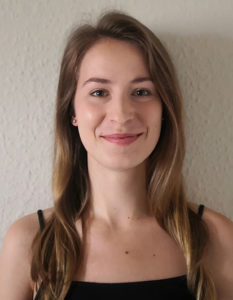
The Montagne Lab would like to welcome Nela Fialova, Research Assistant!
- Tell us about yourself, your background, and what made you choose Neuroscience in particular?
My name is Nela and I am originally from the Czech Republic but have been living in Scotland for the past 7 years. When I was little, I suffered a case of neuroborreliosis leaving me in the hospital for half a year. Luckily, I only remember pieces from this time of my life and no long-term effects persisted. However, if everything didn’t go so well, I could have also been wheelchair-bound for the rest of my life with other neuropathic effects. As I was growing up, I have become more and more interested in the human body, especially the brain. The thought of becoming a neuroscientist intrigued me as there are so many neurological conditions that we do not have an effective treatment for. As a neuroscience researcher, I can strive to find ways to cure those diseases so that more and more people have a happy ending just as I did.
- Why this University and this lab?
I joined the University of Edinburgh as a master student in 2020 and stayed on as a Research Assistant in the Horsburgh lab. As a part of my project was focusing on a genetic model of cerebral Small Vessel Disease, I have stumbled upon some intriguing pericyte changes. I have become more and more interested in pericyte’s role in disease and I was excited about the opportunity to explore this further under the expertise of Dr Montagne. I am looking forward to learning new techniques and growing as a researcher within the fantastic team that is the Montagne lab.
- Tell us a bit about your research project?
As a Research Assistant, I am involved in many projects within the Montagne lab from studying pericyte subtypes along the vascular tree using immunohistochemistry and spinning-disk confocal to helping with behavioural studies. However, my main focus is exploring genetic changes of the vascular cells in response to pericyte loss using single-cell RNA-sequencing and spatial transcriptomics via the Stereo-Seq technology.
- What would you like the impact of this project to be?
I believe that these cutting edge-techniques will bring us closer to uncovering the pathological changes in pericytes and endothelial cells on a molecular level. Focusing on the individual modifications but most importantly on their relationship within the vasculature of various brain regions, we hope to reveal the cell’s role in the context of cerebral Small Vessel Disease and dementia. By identifying early genetic changes, we can target those further using various therapeutic techniques to prevent pathology progression.
- What do you plan to do in the (near) future?
I am very interested in the role of the neurovascular unit in dementia and other neurodegenerative diseases. In the future, I would like to deepen my expertise in various research techniques, gain in-depth insight into the challenges of targeting the vasculature and continue my career development in academia or industry.
26 January 2023
Our lab pictures 2023!
We were lucky to find a beautiful blue sky for our annual lab picture on top of Calton Hill!
13 January 2023
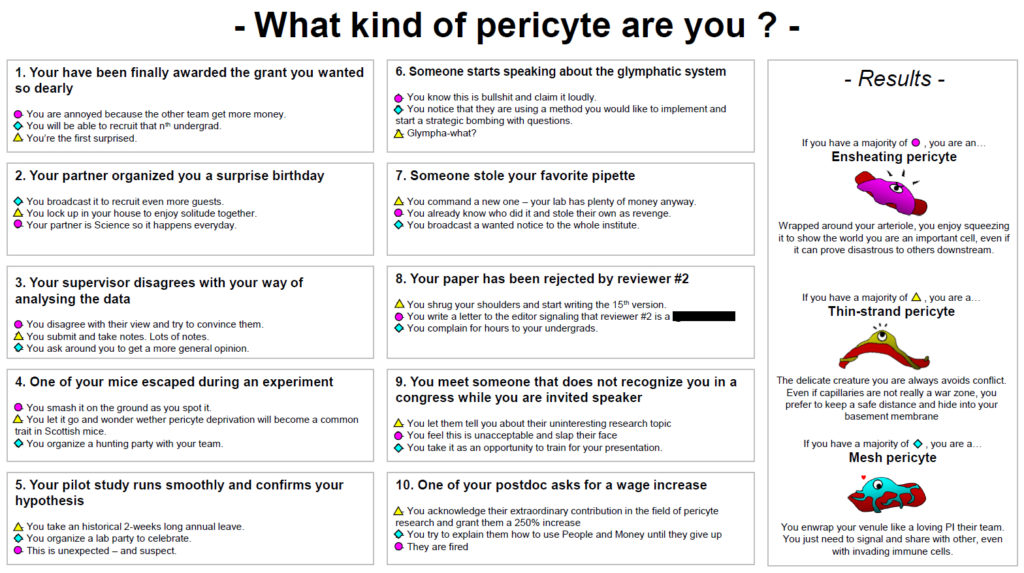
The Pericyte Test!
Audrey Chagnot created this fantastic and nerdy test to find out what kind of pericyte you are! Are you the ensheathing, thin-strand, or mesh type? If you perform the test, please tell us your results by tagging us on Twitter using @MontagneLab. We hope that you will enjoy as much as we did!
Wish you all a great 2023 full of great science!
23 November 2022

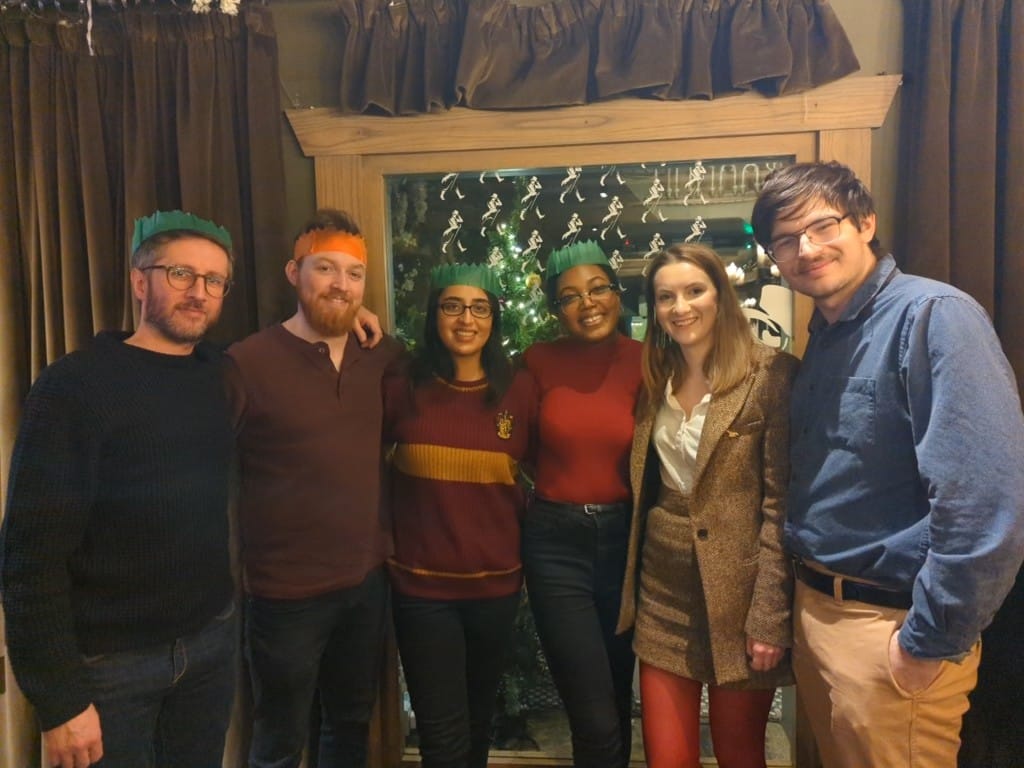
Christmas lab dinner!
We just had our joint Christmas lab dinner at the Ghillie Dhu merging the Diaz-Castro, Gan, Opazo, and Montagne labs. It was a very enjoyable evening enjoying good company, good food and wine, and good vibes!
15 November 2022
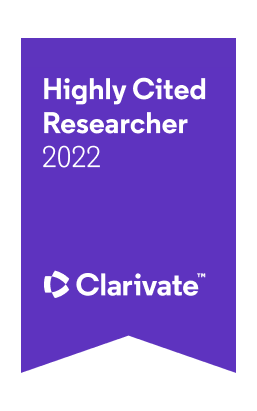
Dr Montagne recognised as a Highly Cited Researcher 2022!
Each year, Clarivate™ identifies the world’s most influential researchers – they select few who have been most frequently cited by their peers over the last decade. In 2022, fewer than 7,000, or about 0.1%, of the world’s researchers, in 21 research fields and across multiple fields, have earned this exclusive distinction.
Axel is among this elite group recognized for his exceptional research influence, demonstrated by the production of multiple highly-cited papers that rank in the top 1% by citations for field and year in the Web of Science™.
31 October 2022
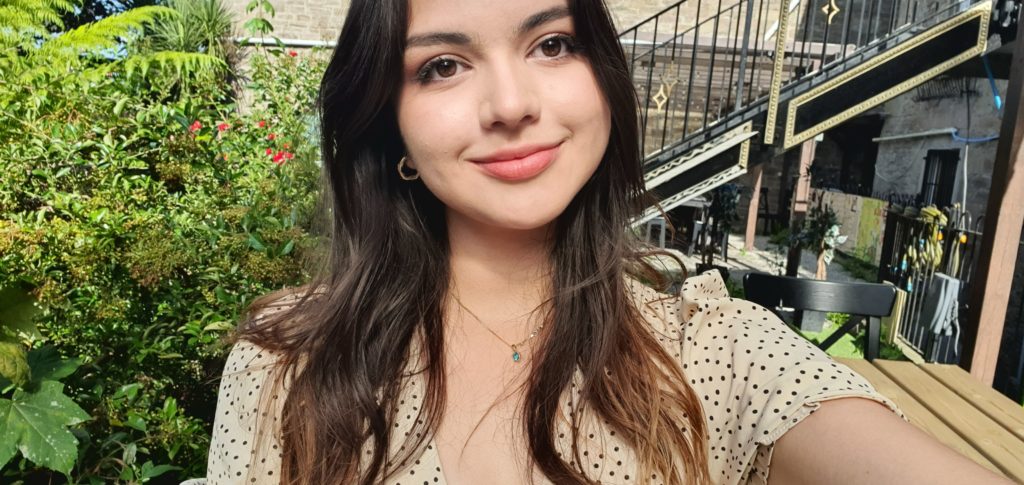
The Montagne Lab would like to welcome María Paula Huertas, MSc Student!
María Paula joined the lab in October 2022 as an MSc Student as part of her 4-year British Heart Foundation (BHF) PhD programme. Co-supervised by Dr. Mairi Brittan, María Paula is working to identify similarities and differences in the endothelial transcriptome of patients with small vessel disease in the heart and the brain.
12 September 2022
Louis, Summer internship in the lab


I had the chance to do an internship this Summer, as part of my Master’s degree in Neuroscience, in the Montagne Lab. It allowed me to discover laboratory work as well as research field, particularly from a pre-clinical point of view. I had the opportunity to participate and invest myself in studies on diverse and fascinating subjects within a close-knit team and a great working atmosphere. This internship was an incredible experience for me. I worked with passionate people who were always ready to share their knowledge. I really thank the whole team who taught me many things that will help me later as a Doctor. I will miss working with you very much. This placement encouraged me to do research in my future practice.


Louis Fizelier
Summer intern, Montagne Lab
26 August 2022
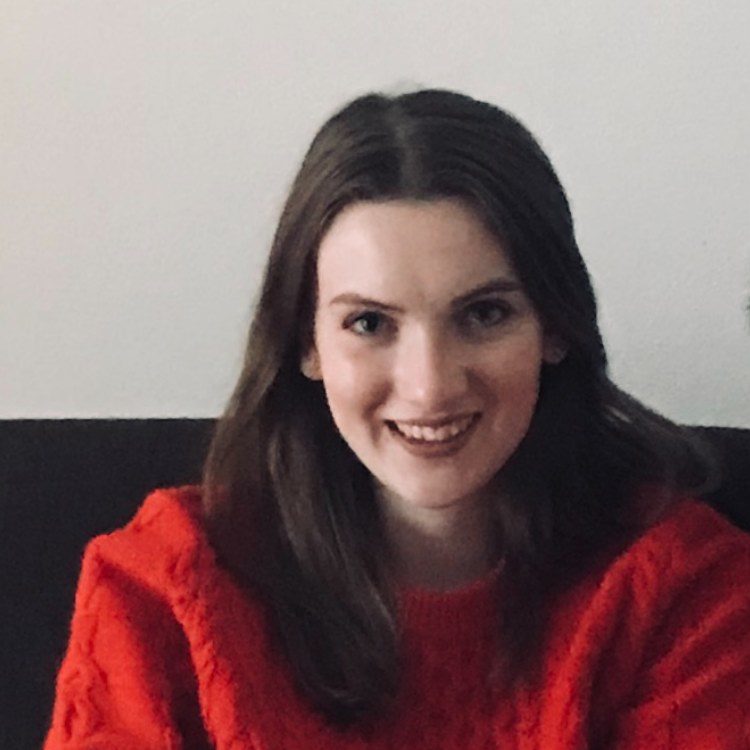
The Montagne Lab would like to welcome Dorota Stefancova, Ph.D. Student!
- Tell us about yourself, your background, and what made you choose to do a Ph.D.?
My name is Dorota and I grew up in Slovakia. When I was little, my grandparents had a small farm and I loved helping out with the animals. Unfortunately, my grandfather suffered a series of brain strokes. Since then I became very interested in medicine, and throughout my high school years I thought I would be studying medicine. However, I found the impact I could make as a scientist more exciting, and decided to apply for the neuroscience program in Edinburgh, where I moved four years ago. Beginning in my first year, I did a number of Summer internships where I had the chance to work on pericytes, which became my favourite cell type. During these internships, I fell in love with research and so a PhD felt like a natural next step.
- Why this University, this lab, and this project?
The University of Edinburgh is well-known for its outstanding neuroscience research. Edinburgh is home to a large number of labs, which provide an ideal environment for learning and professional development. I joined the Montagne Lab in January 2022 for my Honour’s (bachelor) project, which centred on mapping pericytes in the whole mouse brain. This fascinating project allowed me to experience Dr. Axel Montagne’s amazing mentorship, and also introduced me to my fantastic colleagues: Dany, Conor, and Audrey. When I was offered the opportunity to continue studying brain pericytes in the Montagne Lab, I didn’t hesitate!
- Tell us about your specific research project?
Brain pericytes are mural cells that wrap around endothelial cells and are embedded within the basement membrane of the smallest blood vessels. When brain pericytes are lost, the blood-brain barrier starts to break down which leads to neurovascular dysfunction and subsequent neurodegeneration associated with cognitive decline. There are three major pericyte suptypes which have different molecular signatures and functions. It is possible that one specific subtype could play a major role in the development and progression of diseases associated with pericyte malfunction, such as Alzheimer’s disease, cerebral small vessel disease, and stroke. However, which pericyte subtype is involved, at what stage of the disease, and where in the brain remain unknown. Under the supervision of Dr. Axel Montagne, my research aims to investigate the role of these pericyte subtypes in dementia using novel animal models, MRI, and other in vivo imaging techniques.
- What would you like the impact of this project to be?
More than 55 milion people worldwide suffer from dementia. Despite research efforts in the past years, many aspects of dementia remain poorly understood, and there is still no effective treatment for this syndrome. I hope to increase our current knowledge about the causes of dementia. Hopefully, this project will identify a specific pericyte subtype that can be targeted therapeutically in order to restore vascular, neuronal, and behavioural functions.
- What do you plan to do after you complete your Ph.D.?
Pericytes fascinate me and I truly believe that focusing on their functions in the context of dementia is not only crucial for expanding our understanding of this syndrome, but also could help designing vascular-targeted treatment strategies to protect the brain in dementias and possibly other neurological disorders. Therefore, I would love to continue in this direction after completing my PhD.
19 August 2022
Mechanisms of Cerebral Small Vessel Disease: Challenge Workshop
Crans-Montana, Switzerland – June 29th-July 3rd, 2022
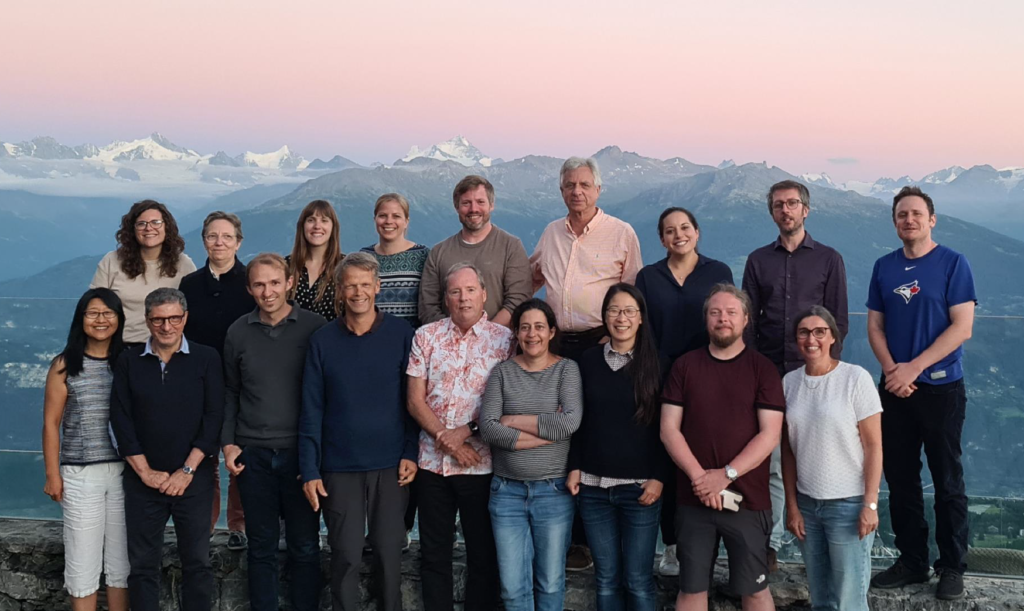
It is not often you get to spend a few days abroad with some of the brightest scientific minds whose work forms the building blocks of your field. Sharing that experience with the magnificent backdrop of the Swiss Alps was nothing short of an immense privilege- and an inspiring and enriching learning experience I will carry with me the rest of my career.



Last month, Axel and I attended a challenge workshop on the mechanisms of small vessel disease hosted in Crans-Montana, Switzerland. The meeting was partly funded by the Neuroscience School of Advanced Studies (NSAS) and was attended by some of the most remarkable and prolific scientists in the field, including: Martin Dichgans, Martin Lauritzen, Anne Joutel, Richard Daneman, Chenghua Gu and Mark Nelson.

Of course, there is much to gain from large and lively scientific conferences where posters and networking opportunities abound- but there was something uniquely magical about the structure of this intimate meeting. We had the privilege of occupying a magnificent and secluded hotel in the Alps, which also meant that between lectures, we would have scheduled blocks of time to engage in leisurely activities and meals as a group. As for the lectures, each speaker hosted a 3-hour talk, but these were far from the structured presentations I have grown accustomed to. The speaker would commence with a condensed background of their life’s work and build up to discussing current projects (including unpublished data), what challenges they have confronted along the way, what they have learned through their experiences and what directions they believe the field is heading towards. Perhaps the most valuable aspect of these sessions was the informal discussion-based nature of them; questions were encouraged and indeed often led to hour-long tangential discussions that served to challenge what we think we know and inspire us to adopt new ways of looking at old problems.
I have read some particularly impressionable papers countless times over the past few years, often imagining how enriching it would be to discuss them with the authors themselves. I won’t be quick to forget the surreal and humbling experience that was getting to know some of the brilliant scientists and kind people behind these papers – over rounds of raclette and wine, watching the sun set behind Mont Blanc, no less! Every evening ended with engaging and lively discussions about everything- from work-life balance to physics, and of course, the all-important strands that bind us together- cerebral small vessels.



In the frenzied haste of our daily lives as scientists- collecting and analysing data, troubleshooting, writing, reading, imaging, staining and staining, and then staining some more… it is easy to forget the enormous importance of stepping back from our benches and gaining some perspective through meaningful communication with other people in the field. Sitting in a room with clinicians and scientists from different corners of the world, all attempting to reach the same mountain peak via different paths, served as a stark reminder that we have everything to learn from each other. As long as we take the time to truly communicate and cooperate, the future of SVD research is surely bright.



I would like to give a huge thanks to Axel and the meeting organisers and attendees for what will no doubt remain one of the most exceptional and formative experiences in my career- certainly a tough one to top!



Dany Jaime Garcia
Wellcome Trust Translational Neuroscience PhD, Montagne Lab
18 August 2022

The Montagne Lab would like to welcome Krystal Laing, Ph.D. Student!
- Tell us about yourself, your background, and what made you choose to do a Ph.D.?
Hi there, I’m Krystal! I’m from the northeast region of the United States, specifically the state of Connecticut. I lived in New York for 3 years before moving to Edinburgh, and my family is originally from Jamaica. Growing up, I always knew I wanted to contribute to science and medicine in some way, but it wasn’t until my second year of undergrad that I discovered my passion for neuroscience. During that time, I was introduced to the wide breadth of interdisciplinary concepts that fit within the field of neuroscience, and the extensive variety of tools and techniques developed to study everything from psychology to genetics. Ultimately, I was sold on the notion of being able to study a disorder by analyzing records of a patient’s physical symptoms and self-reported experience, along with information about the underlying genetic and molecular mechanisms involved. Additionally, I became increasingly aware that in order to improve current methods of diagnostics and therapeutics for all patients, effective and equitable translational research is imperative.
- Why this University, this lab, and this project?
The University of Edinburgh is renowned for its interdisciplinary approach to studies, in particular, the Translational Neuroscience Ph.D. programme encourages a multi-disciplinary research approach and facilitates collaboration and learning opportunities with leading clinicians and scientists. Here I have the opportunity to train as a scientist, gain skills and develop expertise in research on preclinical and clinical neuroscience, through the lens of translational research. And I’m so glad I get to do this with the Montagne Lab! I think beyond the cutting-edge approaches and techniques, and the rather compelling questions being asked, I enjoy how passionate everyone is about the science and real-world impact this has on patients. The first paper I read by Dr. Montagne (2020) discussed the role of APOE4 in BBB dysfunction and cognitive impairment. The concepts presented encouraged me to think about the role of APOE in dementia with a new perspective on pericyte (dys)function. In many ways, this project is a continuation of the concepts presented then.
- Tell us about your specific research project?
Apolipoprotein E (APOE) is a primary susceptibility gene in Alzheimer’s disease, with implications in amyloid-β pathology, neurodegeneration, and dementia. It is also a lipid transport protein that is important for the maintenance of cholesterol levels, lipid metabolism, and vascular homeostasis. Under the supervision of Dr. Axel Montagne and Prof. Joanna Wardlaw, I will investigate the functional differences in APOE-mediated BBB mechanisms in preclinical and clinical settings. There is still so much to be understood about the underlying mechanisms which contribute to dementia. I hope to further understand the multifaceted contribution of APOE to vascular-related dysfunction in dementia, and how clinical presentations of patients with varying genotypes may be differentially impacted.
- What would you like the impact of this project to be?
Studies have shown that approximately 25% of the population are carriers of APOE4 gene, not to mention there is growing evidence that indicates potentially less harmful effects of APOE4 function in some demographics. I hope that this project will contribute to the growing evidence of research aimed at understanding the vascular mechanisms underlying dementia. By elucidating the role of APOE in blood-brain barrier dysfunction, we will be able to further identify the impact of APOE genetic variations in dementia for the downstream benefit of advanced diagnostics, therapeutics, and ultimately to the aid of personalized patient treatment.
- What do you plan to do after you complete your Ph.D.?
I’m enjoying the direction of this project and I am passionate about contributing to translation research that benefits and advances patient care. I hope to continue to contribute to this field but whether that is in academia or industry, is still to be determined!
11 August 2022
FENS Forum 2022 in Paris
The Federation of European Neurosciences (FENS), the main neuroscience society in Europe, held its annual forum last month in Paris. The event gathered over 7,500 international neuroscientists and 4,000+ presentations and posters.
We presented our latest advances with a talk by Dr Axel Montagne titled “Dysfunction of the Blood-Brain Barrier in Dementia” and a poster by Dr Audrey Chagnot detailing the “Vas-O-Matic” tool for image analysis that she is currently developing.





5 June 2022
Brain 2022 in Glasgow & Guests in Edinburgh
The Brain & Brain PET 2022 was held last week in Glasgow (Scotland). It felt great to attend in-person and catch up with colleagues. Obviously, the whole lab went as it is one hour drive/train from Edinburgh. Lots of very interesting vascular talks and posters including a fantastic symposium titled “Pericytes in Disease” with a lineup composed of Drs Hall, Shih, Korte, & Mäe.





After the conference, Dr Andy Shih, Associate Professor at Seattle Children’s Research Institute and the University of Washington, visited us at the UK DRI at Edinburgh on June 2nd. We had a great time discussing transitional pericytes, blood flow, pericyte blasting, and so on.


We also had the chance to host Dr Kassandra Kisler, Assistant Professor of Research at the University of Southern California, on June 3rd. She gave a talk revolving around pericyte functions, in vivo two-photon microscopy, neurovascular uncoupling, capillary stalling, and more.

10 May 2022
ESOC 2022 in Lyon


The 8th European Stroke Organisation Conference (ESOC 2022) was held last week in Lyon (France). Dr Axel Montagne was part of a symposium titled ‘The vascular side of neurodegeneration: a preclinical and clinical perspective‘, along with Drs Duchesne (Canada), Vivien (France), Whiteley (Scotland), and Lauritzen (Denmark).



Dr Montagne’s talk was titled “Changes to the blood-brain barrier in Alzheimer’s disease“. He explained the vascular contribution to dementia with the important role of pericytes and BBB, and he elaborated on the key questions that his lab is currently focusing on. Moreover, he presented for the first time the data generated by his talented lab members Dorota, Dany, Audrey, and Conor.



Looking forward to next year in Germany!
📰 Link here: https://2022.eso-conference.org/
18 April 2022
Ellie, a visiting student interested in science
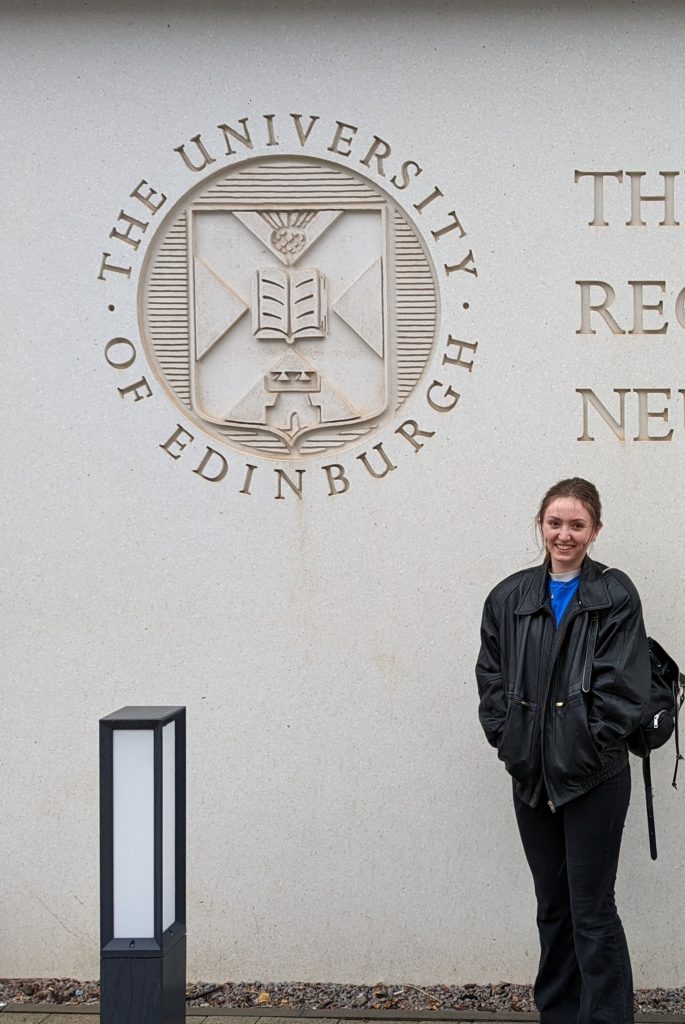
“I’m Ellie and I am a first year A-level student from Southend, Essex. I have always had an interest in science, specifically biology, and was keen to complete lab work experience to further develop my passion and knowledge around the subject and potential career paths I could endure. Being given the opportunity to use the lab equipment and submerging myself into the day-to-day life of a postdoc researcher, was definitely a surreal experience. It was amazing to see the content I am learning in my A-levels in action, and it further clarified my decision to pursue a career in the scientific field.”
22 March 2022
17th European Molecular Imaging Meeting | EMIM 2022 – Thessaloniki, Greece – 15-18 March 2022

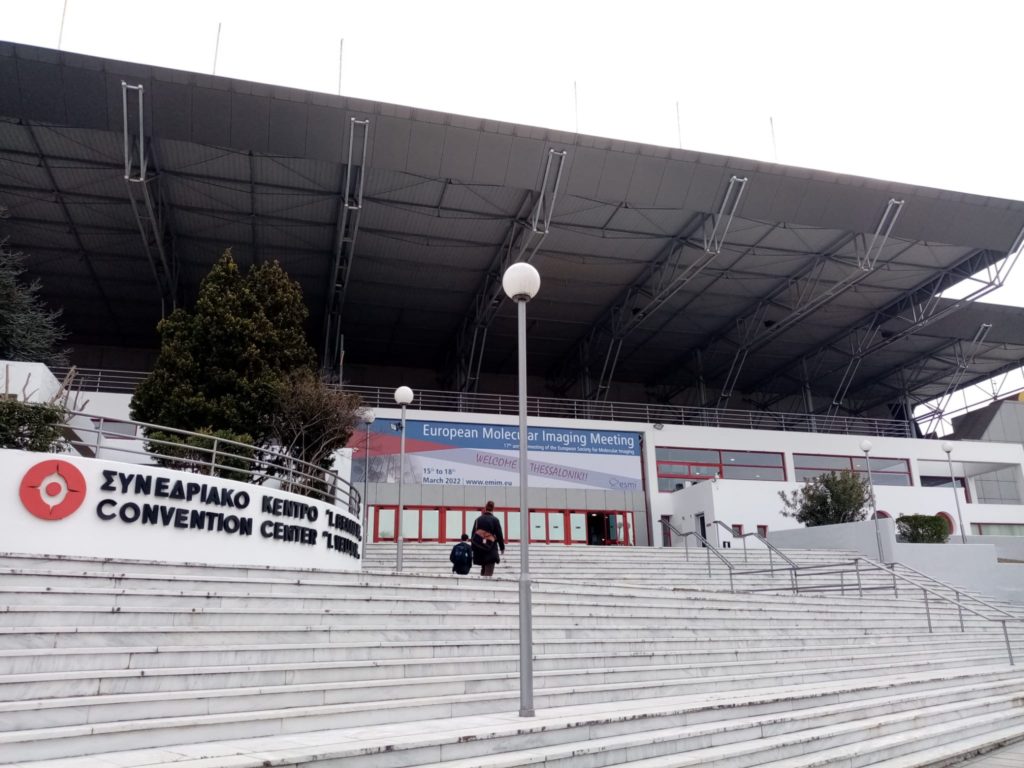

What a pleasure to be in-person at the EMIM 2022 in Thessaloniki to share science with the imaging community!



Dr Axel Montagne gave a plenary lecture titled “Prediction of cognitive decline using contrast MRI” where he explained the vascular contribution to dementia with the important role of pericytes and BBB, and how imaging can help address key questions in the field.


Dany Jaime Garcia gave a lecture titled “Multi-contrast MRI to examine vascular dysfunction in pericyte-deficient mice” where she explained the use of multiparametric MRI to quantify the early stages of vascular dysfunction in pericyte-deficient animals, enabling us to learn more about Small Vessel Disease pathogenesis.
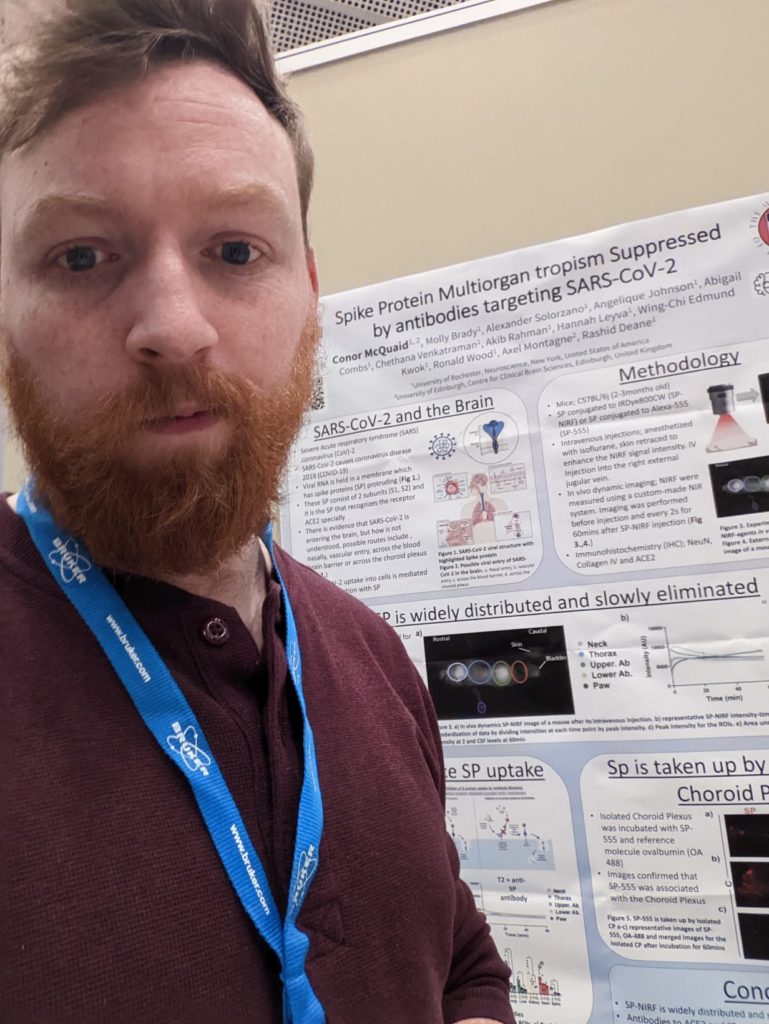
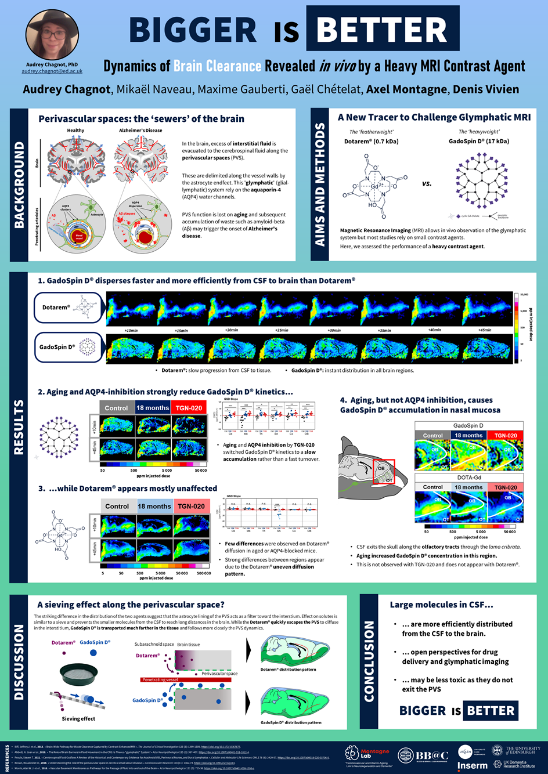
Dr Conor McQuaid and Dr Audrey Chagnot presented their posters, respectively titled “Spike protein multiorgan tropism supressed by antibodies targeting SARS-CoV-2” and “Bigger is better: dynamics of brain clearance revealed by a heavy MRI contrast agent”.



See you next year!
📰 Link here: https://e-smi.eu/meetings/emim/emim-2022/
19 January 2022
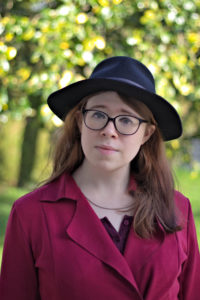
The Montagne Lab would like to welcome Audrey Chagnot, postdoctoral fellow!
- Tell us about yourself, your background, and what made you choose academic research and neuroscience in particular?
What I love in Science is that it raises new questions when it solves older ones. Neuroscience in particular grabbed my interest, as close it is to the sci-fi novels I was reading as a child.
I got my PhD degree in 2021 within the INSERM U1237 team at Normandy University, France. There, I used magnetic resonance imaging to investigate the glymphatic system, a perivascular route for brain waste drainage.
- Why this University and this lab?
The Montagne Lab is a young team whose interest in imaging and brain ageing I share. Here, I hope to learn a lot about how to build and lead a research team.
- Tell us about your specific research project?
Blood-brain barrier (BBB) disruption occurs in ageing and is associated with dementia. Endothelial cells and pericytes are closely associated actors of the brain vasculature. Dysfunctions of both cell types have been evidenced in ageing and dementia, though the precise mechanisms leading to BBB disruption are unknown. In the Montagne Lab, I will primarily investigate the interplay between pericytes and endothelial cells in a variety of in vivo models, with MRI, PET and 2-photon imaging.
An associated consequence of ageing is the swelling of perivascular spaces, described as a route for brain waste drainage. A second part of my project will focus on this transformation and its relations with BBB disruption.
- What would you like the impact of this project to be?
Neuroimaging is an essential pillar for the screening, diagnosis, and prognosis of dementia. I hope that my work will improve the day-to-day care of elderly and/or demented people.
- What do you plan to do after your postdoc?
I hope to become a PI, either in academy or industry.
8 January 2022
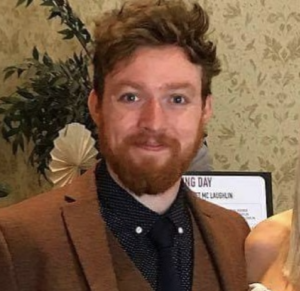
The Montagne Lab would like to welcome Conor McQuaid, postdoctoral fellow!
- Tell us about yourself, your background, and what made you choose academic research and neuroscience in particular?
I am 29 years old (soon to be 30!) and am originally from Northern Ireland but have spent the last 2 years in the USA. As a kid I was always interested in science, but as I have gotten older, I have seen the effects of Dementia firsthand, and neurodegenerative diseases have affected both sides of my family, so my ultimate goal is to work towards a better understanding, possible treatment or even a cure for this horrific set of diseases.
- Why this University and this lab?
During my PhD and postdoc I have read numerous paper from Dr. Montagne, and when the opportunity arose to work under his mentorship, I jumped at the chance. The fact his group is at the University of Edinburgh is an added bonus as I am a big fan of the city and love the highlands.
- Tell us about your specific research project?
As my interest in Neurodegenerative disease and dementia has developed the blood-brain barrier and the cells of the neurovascular unit have been central to my understanding and work. I will now, under Axel, get to investigate the crosstalk between pericytes and endothelial cells, their role in both health and disease, and how these cells can link to the immune system and pathology of disease.
- What would you like the impact of this project to be?
I think this project could lead to a fundamental revaluation of the role of pericytes and endothelial cells, their individual roles, and more interesting their crosstalk in Small Vessel Disease and wider neurodegenerative diseases. This will hopefully lead to new and fruitful therapeutic targets and eventually to some real world solutions.
- What do you plan to do after your postdoc?
I think this project could lead to some real results that hopefully I can continue to contribute to after this position funding ends, and with Axel’s guidance and mentorship, can lead into a fellowship and a further career in research.
24 November 2021
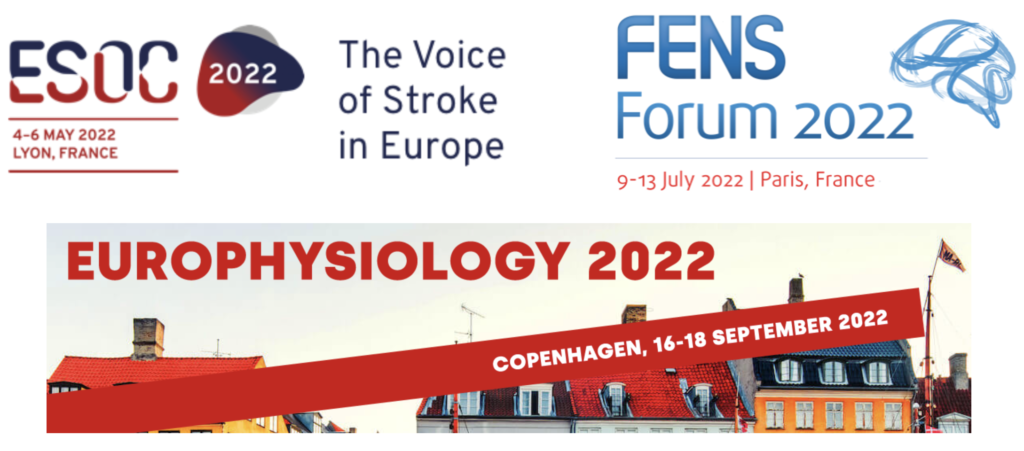
Three vascular symposia in 2022!
Dr Axel Montagne was invited to deliver a presentation during:
– the 8th European Stroke Organisation Conference (ESOC 2022) which will be held May 4-6th, 2022 in Lyon (France). The symposium is titled ‘The vascular side of neurodegeneration: a preclinical and clinical perspective’ and will also have Drs Duchesne (CA), Vivien (FR), Whiteley (GB), and Eyo (US). Dr Montagne’s talk is titled “Changes to the blood-brain barrier in Alzheimer’s disease“.
– the 13th Federation of European Neuroscience Societies (FENS 2022) which will be held July 9-13th, 2022 in Paris (France). The symposium is titled ‘Vascular hypotheses for understanding and restoring memory impairments’ and will also have Drs Wardlaw (GB), Duplaà (FR), and Dabertrand (US). Dr Montagne’s talk is titled “Dysfunction of the blood-brain barrier in dementia“.
– the 2nd Europhysiology symposium (Europhysiology 2022) which will be held September 16-18th, 2022 in Copenhagen (Denmark). The symposium is titled ‘Contributions of smooth muscle cells and pericytes to brain blood flow regulation’ and will also have Drs Keller (SW), Dessalles (FR), and Grubb (DK). Dr Montagne’s talk is titled: TBD.
22 November 2021
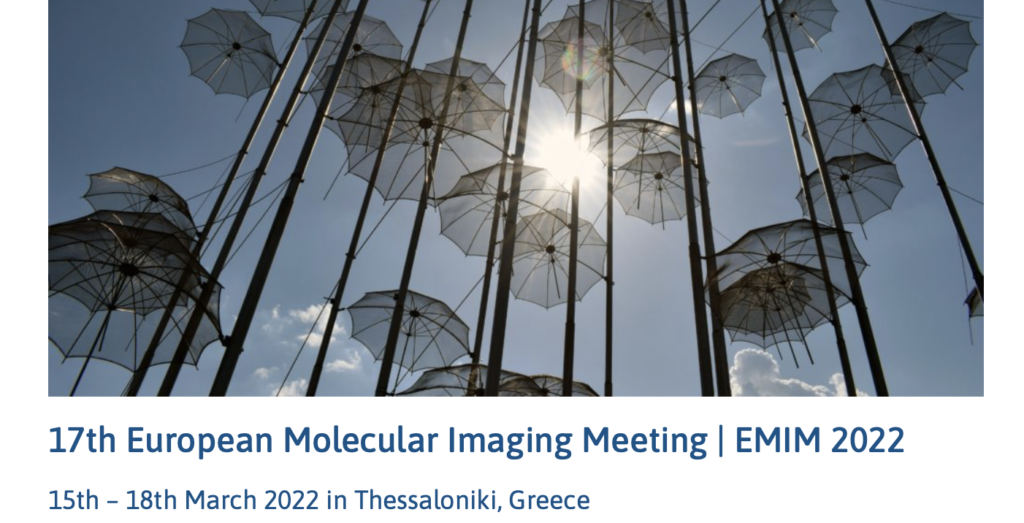
Plenary lecture at EMIM 2022!
Dr Axel Montagne was invited to give a plenary lecture at the 17th European Molecular Imaging Meeting in Thessalonik (Greece), scheduled for March 17th, 2022 at 17:45 (EET). His talk is titled “Prediction of cognitive decline using contrast MRI”.
📰 Link here: https://bit.ly/32vZB2k
29 September 2021

Targeting Blood-Brain Barrier dysfunctions in Dementia is a priority at the UK DRI in Edinburgh
Year by year, our knowledge of the fundamental biology behind dementia is improving and with it, progress made on promising new therapeutics. What has become most evident is the need to target the earliest stages of diseases like Alzheimer’s, to maximise impact and save as much of the brain as possible. A growing area of interest is the specialised blood vessel network surrounding the brain, the blood-brain barrier (BBB), whose dysfunction and breakdown is thought to be one of the initial events in several neurodegenerative diseases.
You can read here from UK DRI experts in the field including Profs. Wardlaw and Hardingham, Dr. Diaz-Castro, and myself: https://bit.ly/3CXB3w8
27 September 2021

SCOR Young European Research Prize!
Dr Axel Montagne, Group Leader at UK DRI at Edinburgh, has been awarded this year’s SCOR Young European Researcher Prize for his research on how cerebrovascular dysfunction contributes to neurodegeneration and cognitive impairment in animal models and humans.
The award jury, composed of renowned European researchers, was chaired by Pr. Jean-François Dartigues of the Bordeaux Population Health Research Center. Commenting on the award, André Levy-Lang, Chairman of the SCOR Foundation for Science, said: “Advances in Alzheimer’s disease research, which the SCOR Foundation has supported for many years, play a key role in managing the risks faced by older age groups”.
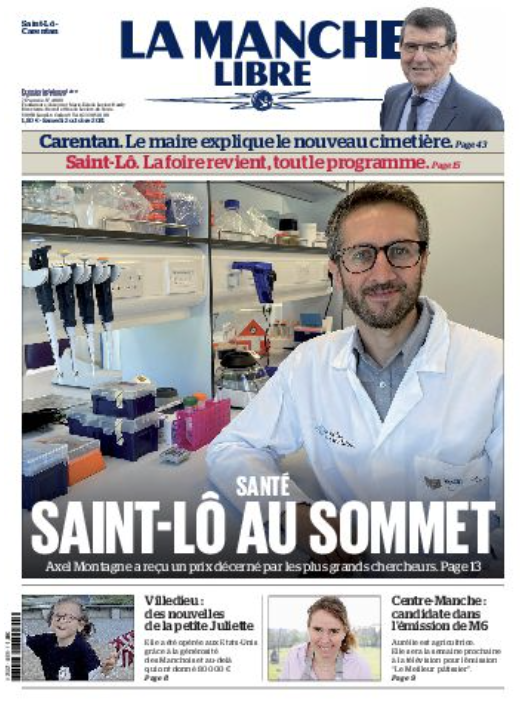
📰 Relevant links here:
👉🏻 Fondation Recherche Alzheimer: https://alzheimer-recherche.org/axel-montagne/
👉🏻 SCOR: https://www.scor.com/en/expert-views/scor-young-european-research-prize-research-alzheimers-disease
👉🏻 UK DRI: https://ukdri.ac.uk/news-and-events/dr-axel-montagne-receives-scor-young-european-researcher-prize
👉🏻 La Manche Libre: https://www.lamanchelibre.fr/actualite-957553-sante-maladie-d-alzheimer-un-chercheur-saint-lois-se-distingue
👉🏻 Ouest France: https://www.ouest-france.fr/normandie/saint-lo-50000/entretien-ce-chercheur-normand-espere-un-traitement-contre-alzheimer-d-ici-a-10-ans-4eeb7732-2081-11ec-aeab-7e1fbac55cd7
👉🏻 La Presse de la Manche: https://actu.fr/normandie/saint-lo_50502/un-manchois-recoit-le-prix-europeen-jeune-chercheur-2021-pour-ses-travaux-sur-alzheimer_45710407.html
👉🏻 Choisir la Normandie: https://choisirlanormandie.fr/sante-les-recherches-dun-normand-recompensees/
👉🏻 Manche Mag’: https://www.manchemag.fr/2021/12/le-chercheur-a-trouve-sa-voie-sur-le-tard/?fbclid=IwAR0qcLNAYmX77ER3Do6UZsL5xAKJeTBk82-RQf2UzN33VC_BF42wUbc3ONg
👉🏻 Leducq SVD Network: https://www.small-vessel-disease.org/news-events/dr-axel-montagne-awarded-the-scor-european-young-investigator-award-2021
👉🏻 Row Fogo Centre: https://www.ed.ac.uk/clinical-brain-sciences/research/row-fogo-centre/news-and-events/news/montagne-european-young-investigator-award
18 August 2021

MRC Career Development Award!
We are thrilled to announce that Axel Montagne has been awarded an MRC Career Development Award (CDA) fellowship for his project entitled “Interplay between brain endothelial cells and pericytes in brain health and disease”. The fellowship will start on the 1st of January 2022 and will run for 5 years. Of note, his Wellcome Trust Sir Henry Dale Application was successful too.
This proposal has broader relevance to human SVD and AD where pericytes were shown to die early. The identification of modifiable pathways which contribute to vascular dysfunctions is a major focus of global efforts to tackle the vascular contribution to dementia. The outcome of this proposal will shine light on the cellular and molecular underpinnings of vascular dysfunctions leading to pericyte death. This will not only help to better understand the early pathophysiological processes, ultimately triggering neurodegeneration and dementia, but also help designing vascular-targeted treatment strategies to protect the brain in AD and SVD, and possibly others.
13 August 2021
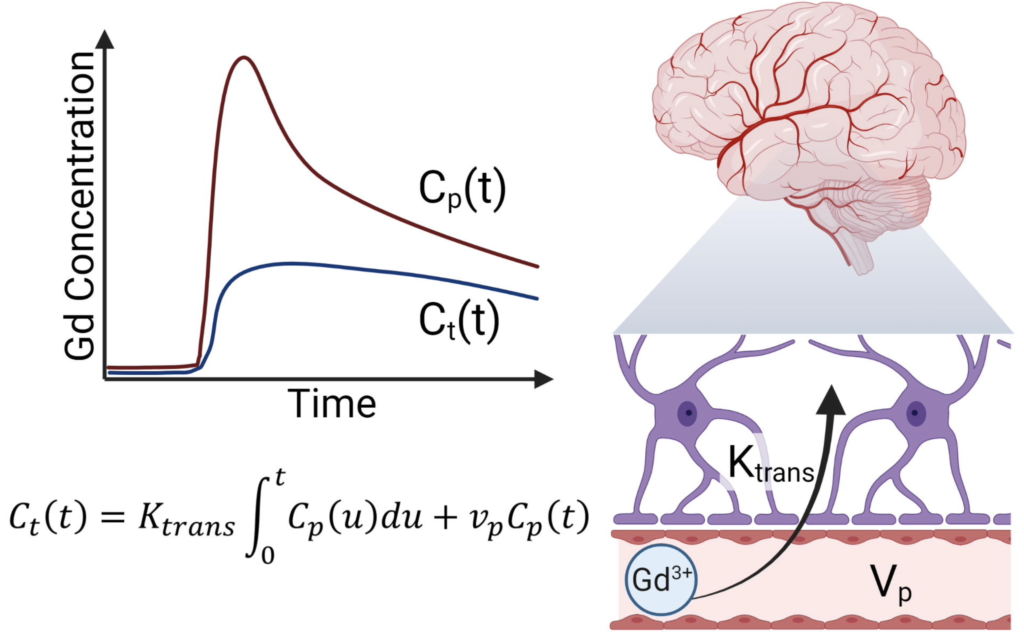
Our BBB & MRI review article is in press today!
In collaboration with my longstanding collaborator Dr. Samuel Barnes (Loma Linda University) and Audrey Chagnot (PhD student in Vivien’s Lab at Université Caen Normandie), we wrote a review article in Neuroscience summarising all the recent contrast MRI studies reporting subtle BBB leakage in dementia, with a particular focus on Alzheimer’s disease and cerebral Small Vessel Disease, and including both clinical and pre-clinical studies.
📰 The article can be found here: https://bit.ly/3xb21Nw
31 July 2021
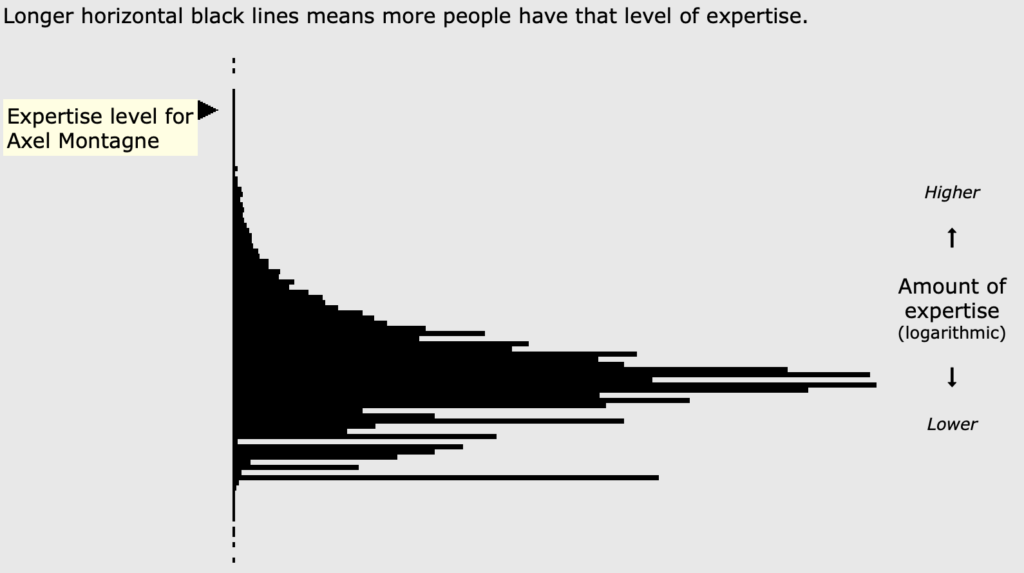
Dr. Montagne recognised as an Expertscape World Expert in the Blood-Brain Barrier!
The expertise of Axel Montagne ranks in the Top 0.014%, actually ranked 8th in the world.
… Of 59,202 published authors worldwide on Blood-Brain Barrier,
… From 2011 through 2021,
… Based on contributions to 18 articles on the topic.
📰 The link can be found here: https://expertscape.com/ex/blood-brain+barrier
28 July 2021

Our first review article is in press today!
In collaboration with Prof. Anna Williams and her PhD student Tessa Procter, we wrote a review in The American Journal of Pathology illustrating how cumulation of loss of endothelial-pericyte crosstalk is a major driving force in dementia pathology, with a particular focus on Alzheimer’s disease and cerebral Small Vessel Disease.
📰 The article can be found here: https://bit.ly/3xb21Nw
26 July 2021
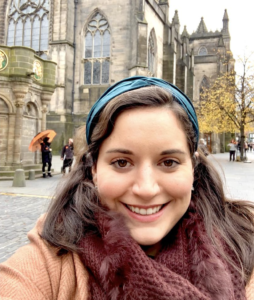
The Montagne Lab would like to welcome Daniela (Dany) Jaime Garcia, first PhD Student!
- Tell us about yourself, your background, and what made you choose to do a PhD?
My name is Daniela (Dany); I was born and raised in Mexico and had an interest in neuroscience from an early age. I obtained my undergraduate degree in Psychology and Neuroscience at Grinnell College (USA) and worked in a neurology rehabilitation clinic shortly after completing my studies. It was there that I was first exposed to the devastating consequences of stroke and vascular dementia, which further motivated me to pursue a research career.
Since then, I have obtained a Stroke Medicine MSc at University College London and worked with Professor Joanna Wardlaw at the University of Edinburgh as a research assistant in clinical studies of small vessel disease (SVD). For me, this PhD represents an opportunity to contribute to research in an area I feel passionate about, whilst developing fundamental skills I will need to participate in future research projects aimed at improving the lives of patients living with vascular dementia.
- Why this University, this lab, and this project?
Working on ways to facilitate the translation of neuroscience research from bench to bedside is a goal I feel strongly about. The University of Edinburgh offers a highly interdisciplinary and collaborative environment where pre-clinical and clinical researchers are in constant communication and research teams are comprised of scientists and clinicians alike. This project is also particularly appealing to me as it has pre-clinical and clinical components and is supervised by Prof. Wardlaw – a radiologist and clinical small vessel disease research expert, and Dr. Montagne – a scientist who has demonstrated a strong commitment to translational neuroscience throughout his career.
- Tell us about your specific research project?
With Dr. Axel Montagne and Prof. Joanna Wardlaw as my supervisors, I plan to examine the role of capillary-enveloping pericytes in the development and progression of the blood-brain barrier breakdown observed in the early stages of SVD and Alzheimer’s disease (AD). Using innovative animal models, in vivo imaging techniques and transcriptomics – as well as data from neuroimaging clinical studies – we aim to examine these aspects of SVD pathophysiology whilst bridging the gap between humans and animals.
- What would you like the impact of this project to be?
Even though SVD is now known to be highly prevalent and an immense burden – to the patients, to their loved ones, and to society – the underlying causes and consequences of it remain poorly understood, and there are no effective treatments. My biggest hope would be to change the way we understand how SVD develops and progresses; more specifically, I want to understand what goes wrong in the earlier stages of the disease with the aim of finding potential pathways that can serve as promising therapeutic avenues to stop it from progressing.
- What do you plan to do after you complete your PhD?
I am committed to a career path in stroke and dementia research; whether this will mainly include pre-clinical or clinical research (or perhaps both), remains to be seen. With the emergence of the UK Dementia Research Institute and other strong, interconnected networks of collaborating scientists working towards the same goal, it is undeniably an exciting time to be involved. Stay tuned!
7 July 2021

This is our new lab logo!
It nicely depicts the science being done in the lab and emphasises the importance of keeping healthy blood vessels to keep your brain healthy.
It basically represents a human brain (top view) with the left hemisphere being healthy and the right hemisphere degenerating due to dementia. There is also a cross-sectional view of a capillary vessel which includes a pericyte wrapping around the endothelium. This vessel is damaged as shown by a drop of blood leaking out into the brain. It reflects the growing body of evidence supporting the involvement of early BBB dysfunction in the development and progression of common dementias such as Alzheimer’s disease and cerebral Small Vessel Disease.
It was an absolute pleasure working with the talented Ella Marushchenko. Quick turn-around, high quality artwork, and reasonable cost. Please visit her website ellamarustudio.com. I highly recommend her 😊
14 June 2021
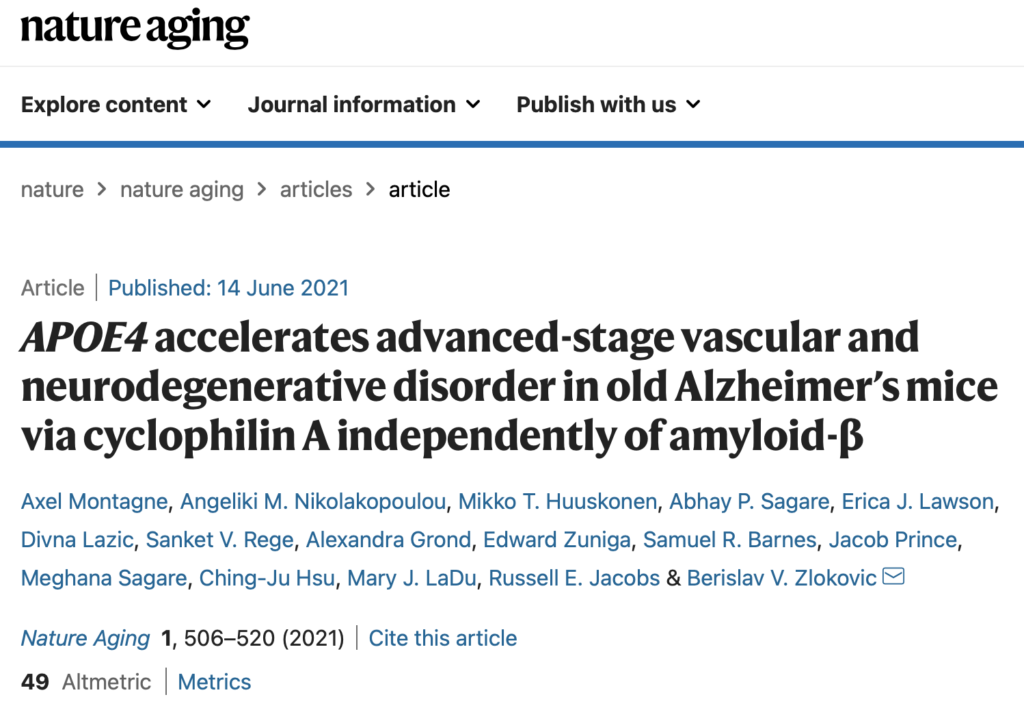
Axel’s last postdoc article as a first author published in Nature Aging
This study not only sheds light on how the APOE4 gene may cause some of the pathologies associated with Alzheimer’s disease, but also suggests a new treatment target (i.e., Alisporivir) that might help people who carry the APOE4 gene in early and late stages of the disease. We found that APOE4 is associated with the activation of an inflammatory protein, Cyclophilin A, that causes a breakdown in the blood-brain barrier which protects the brain.
📰 The article can be found here: https://go.nature.com/3xhBezx
And media coverage there: https://bit.ly/3pRxjXD
23 May 2021
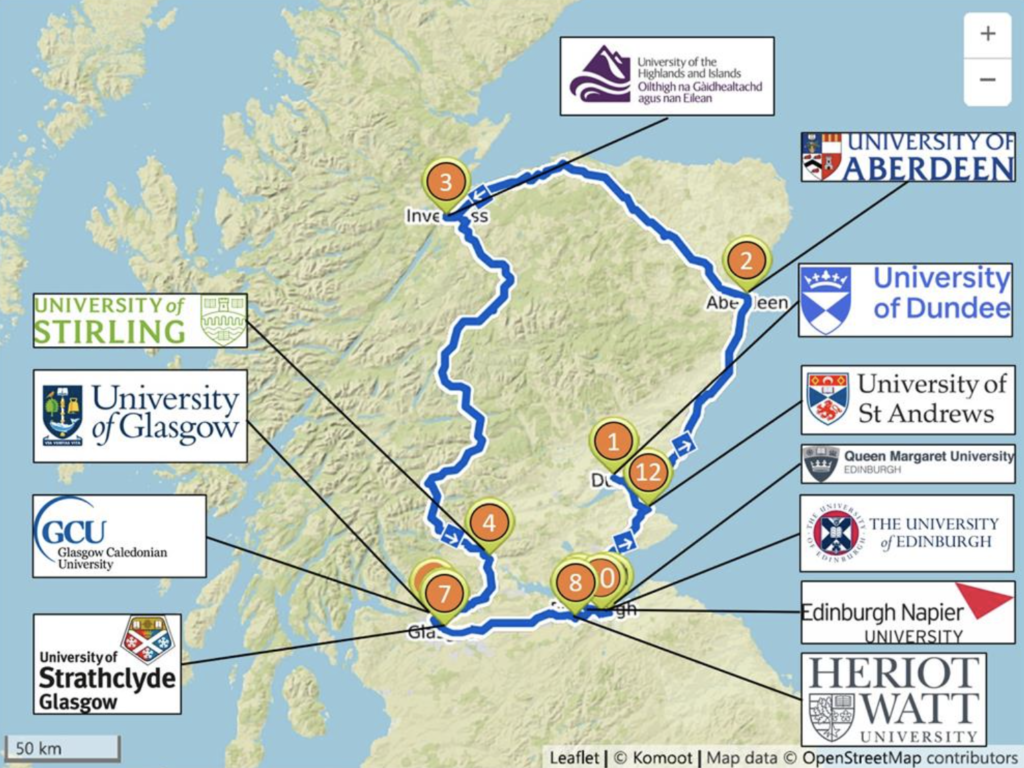
Run the Network Challenge
The idea was to run/walk/cycle/swim over 500 miles to raise money for Alzheimer’s Research UK (ARUK)!
To help support ARUK, the Scotland Network took part in a fundraising challenge to coincide with Dementia Action Week (17th-23rd May). The ARUK Scotland Network is a group of research scientists based at Scottish Universities who are dedicated in finding a cure for Alzheimer’s disease and dementia (https://www.alzheimersresearchuk.org/research/for-researchers/network-centres/scotland-network-centre/).
The challenge was called ‘Run the Network’ and our aim was to accumulatively virtually run (or walk, cycle, swim or any other form of exercise!) the distance between all the Universities in our Network as a group.
Our route is 813 km (just over 500 miles!), starting at the University of Dundee, going up the coast to Aberdeen, across to the University of the Highlands and Islands in Inverness, taking the scenic route down to Glasgow to say hello to our colleagues at Glasgow Caledonian University, University of Strathclyde and the University of Glasgow via the University of Stirling, across the central belt to Edinburgh to see everyone at Napier, Heriot Watt, The University of Edinburgh and Queen Margaret University, before heading into Fife to St Andrews University, and the final stretch back to the University of Dundee to complete the challenge.
Our team (30+ researchers) has completed an incredible 1193.4 miles over 7 days and raised more than £3,000 🎉
You can support these efforts to raise even more money for an incredible charity: https://www.justgiving.com/fundraising/runthenetwork
16 May 2021
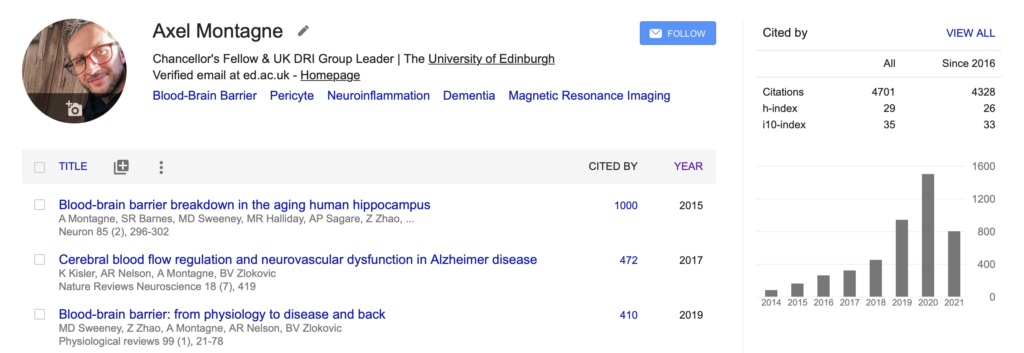
Axel’s postdoc article published in Neuron journal in 2015 reached 1,000 citations today!
By imaging the living human brains, we showed an age-dependent blood-brain barrier (BBB) breakdown in the hippocampus, a region critical for learning and memory, which worsened with cognitive decline and correlated with BBB-associated injury to pericytes.
📰 The article can be found here: https://bit.ly/3byr3OG
12 April 2021

A special edition as guest editor for Frontiers in Aging Neuroscience
We have launched a new Research Topic, “Vascular Inflammation in Aging and Neurodegeneration”.
Topic Editors:
– Dr. Donghui Zhu, Stony Brook University, Stony Brook, United States
– Dr. Axel Montagne, University of Edinburgh, Edinburgh, United Kingdom
– Dr. Zhen Zhao, University of Southern California, Los Angeles, United States
Visit the homepage for this Research Topic for a full description of the project:
📰 https://www.frontiersin.org/research-topics/19510/vascular-inflammation-in-aging-and-neurodegeneration
This is a great opportunity to have your research published in Frontiers in Aging Neuroscience, a leading journal in its field. With an Impact Factor of 4.362 and CiteScore of 6.3, it advances understanding of central nervous system ageing and age-related neural diseases.
The submission deadline for this Research Topic is 31 December 2021.
12 April 2021

A special edition as guest editor for Frontiers in Cellular Neuroscience
We have launched a new Research Topic, “Multifaceted interactions between immunity and the diseased brain”.
Topic Editors:
– Dr. Sandro Dá Mesquita, Mayo Clinic Florida, Jacksonville, United States
– Dr. Axel Montagne, University of Edinburgh, Edinburgh, United Kingdom
– Dr. Kristen E Funk, University of North Carolina at Charlotte, Charlotte, United States
– Dr. Ana Luisa Mendanha Falcao, Life and Health Sciences Research Institute, School of Medicine, University of Minho, Braga, Portugal
Visit the homepage for this Research Topic for a full description of the project:
📰 https://www.frontiersin.org/research-topics/16559/multifaceted-interactions-between-immunity-and-the-diseased-brain
This is a great opportunity to have your research published in Frontiers in Cellular Neuroscience, a leading journal in its field. With an Impact Factor of 3.921 and CiteScore of 5.4, it advances understanding of the cellular mechanisms underlying cell function in the nervous system across all species.
The submission deadline for this Research Topic is 31 May 2021.
7 April 2021

The Montagne Lab has launched a new website and Twitter handle (@MontagneLab).
📰 https://www.ed.ac.uk/clinical-brain-sciences/research/row-fogo-centre/news-and-events/news/montagne-lab-launched-a-new-website
27 January 2021
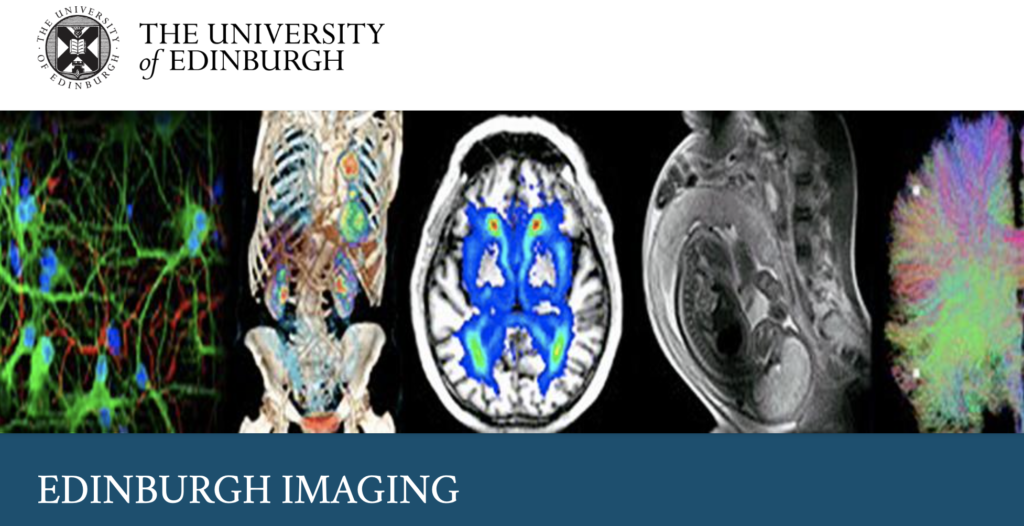
Edinburgh Imaging would like to welcome Dr. Axel Montagne, Chancellor’s Fellow, to the University.
📰 https://www.ed.ac.uk/clinical-sciences/edinburgh-imaging/news/2021-news/27-jan-21-welcome-dr-axel-montagne
